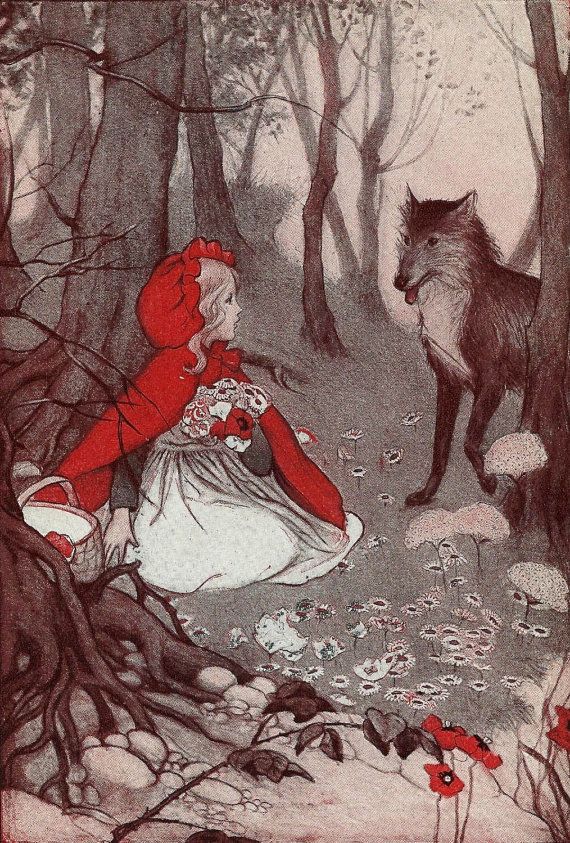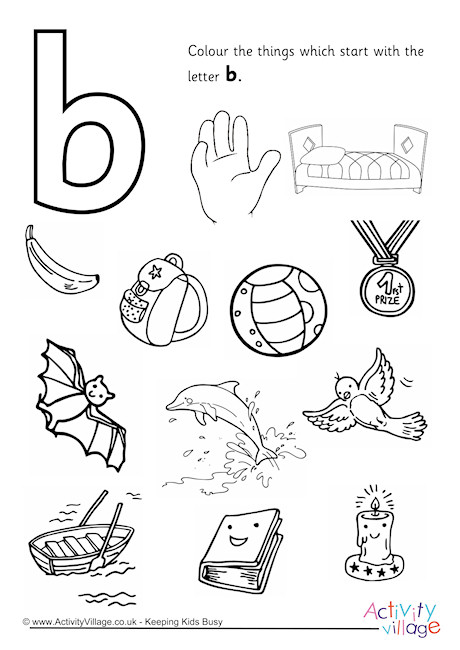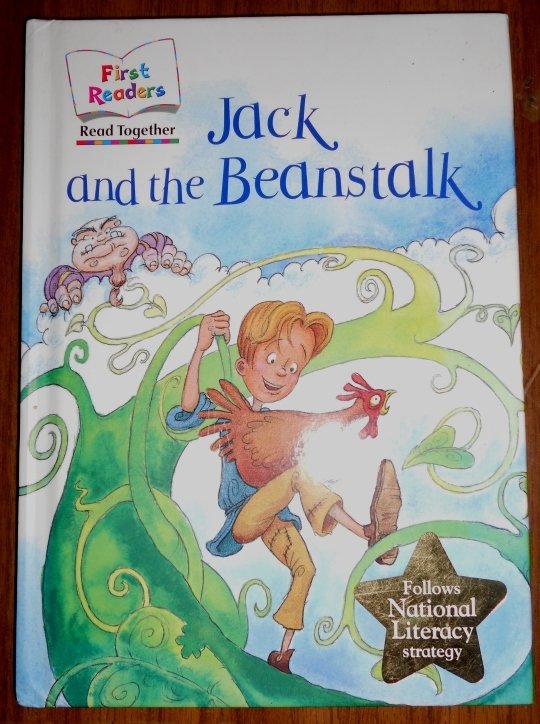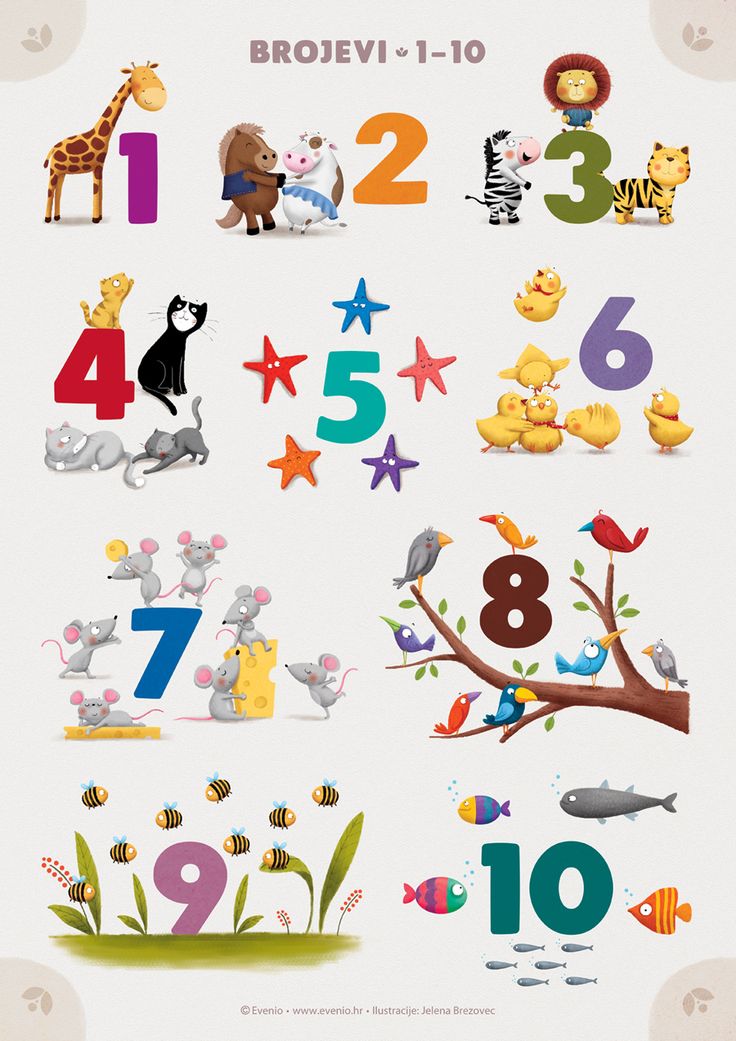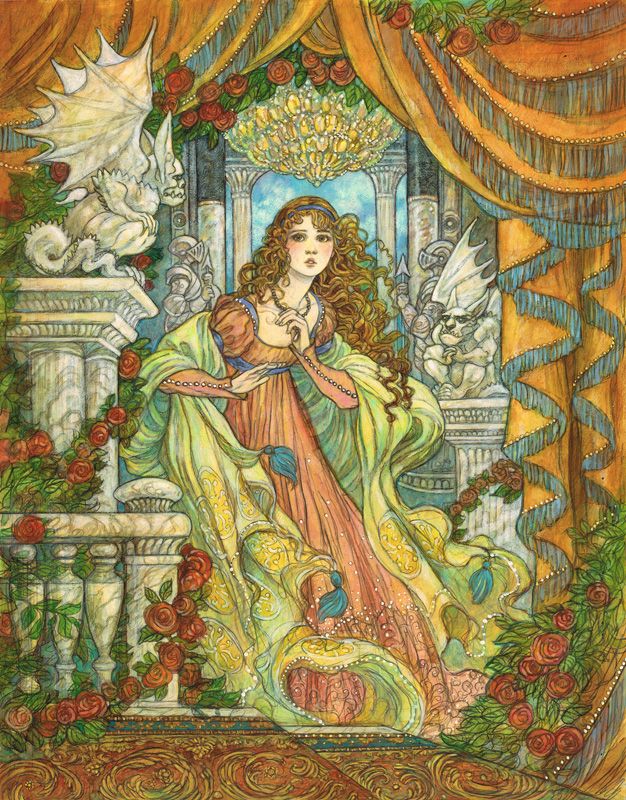Red hood fairy tale
The story of Little Red Riding Hood
[en español]
by Leanne Guenther
Once upon a time, there was a little girl who lived in a village near the forest. Whenever she went out, the little girl wore a red riding cloak, so everyone in the village called her Little Red Riding Hood.
One morning, Little Red Riding Hood asked her mother if she could go to visit her grandmother as it had been awhile since they'd seen each other.
"That's a good idea," her mother said. So they packed a nice basket for Little Red Riding Hood to take to her grandmother.
When the basket was ready, the little girl put on her red cloak and kissed her mother goodbye.
"Remember, go straight to Grandma's
house," her mother cautioned. "Don't dawdle along the way and please don't talk to strangers! The woods are dangerous. "
"Don't worry, mommy," said Little Red Riding Hood, "I'll be careful."
But when Little Red Riding Hood noticed some lovely flowers in the woods, she forgot her promise to her mother. She picked a few, watched the butterflies flit about for awhile, listened to the frogs croaking and then picked a few more.
Little Red Riding Hood was enjoying the warm summer day so much, that she didn't notice a dark shadow approaching out of the forest behind her...
Suddenly, the wolf appeared beside her.
"What are you doing out here, little girl?" the wolf asked in a voice as friendly as he could muster.
"I'm on my way to see my Grandma who lives through the forest, near the brook," Little Red Riding Hood replied.
Then she realized how late she was and quickly excused herself, rushing down the path to her Grandma's house.
The wolf, in the meantime, took a shortcut.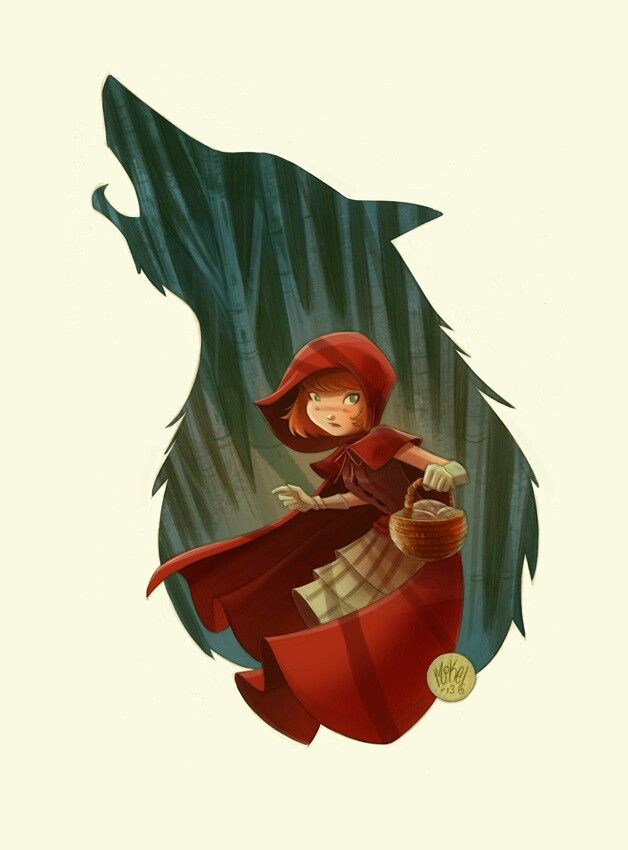 ..
..
The wolf, a little out of breath from running, arrived at Grandma's and knocked lightly at the door.
"Oh thank goodness dear! Come in, come in! I was worried sick that something had happened to you in the forest," said Grandma thinking that the knock was her granddaughter.
The wolf let himself in. Poor Granny did not have time to say another word, before the wolf gobbled her up!
The wolf let out a satisfied burp, and then poked through Granny's wardrobe to find a nightgown that he liked. He added a frilly sleeping cap, and for good measure, dabbed some of Granny's perfume behind his pointy ears.
A few minutes later, Red Riding Hood knocked on the door. The wolf jumped into bed and pulled the covers over his nose. "Who is it?" he called in a cackly voice.
"It's me, Little Red Riding Hood."
"Oh how lovely! Do come in, my
dear," croaked the wolf.
When Little Red Riding Hood entered the little cottage, she could scarcely recognize her Grandmother.
"Grandmother! Your voice sounds so odd. Is something the matter?" she asked.
"Oh, I just have touch of a cold," squeaked the wolf adding a cough at the end to prove the point.
"But Grandmother! What big ears you have," said Little Red Riding Hood as she edged closer to the bed.
"The better to hear you with, my dear," replied the wolf.
"But Grandmother! What big eyes you have," said Little Red Riding Hood.
"The better to see you with, my dear," replied the wolf.
"But Grandmother! What big teeth you have," said Little Red Riding Hood her voice quivering slightly.
"The better to eat you with, my dear," roared the wolf and he leapt out of the bed and began to chase the little girl.
Almost too late, Little
Red Riding Hood realized that the person in the bed was not her
Grandmother, but a hungry wolf.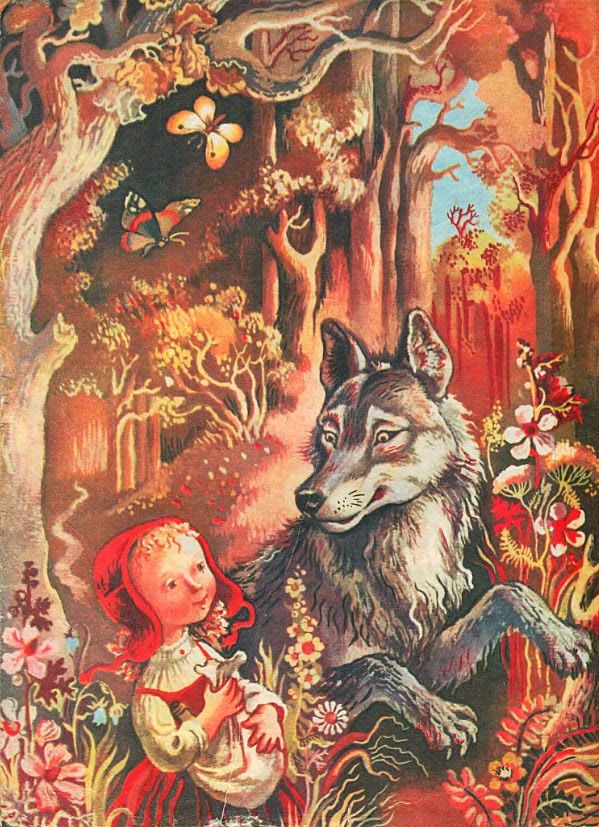
She ran across the room and through the door, shouting, "Help! Wolf!" as loudly as she could.
A woodsman who was chopping logs nearby heard her cry and ran towards the cottage as fast as he could.
He grabbed the wolf and made him spit out the poor Grandmother who was a bit frazzled by the whole experience, but still in one piece."Oh Grandma, I was so scared!" sobbed Little Red Riding Hood, "I'll never speak to strangers or dawdle in the forest again."
"There, there, child. You've learned an important lesson. Thank goodness you shouted loud enough for this kind woodsman to hear you!"
The woodsman knocked out the wolf and carried him deep into the forest where he wouldn't bother people any longer.
Little Red Riding Hood and her Grandmother had a nice lunch and a long chat.
Printable version of this page
Story Pages Templates:
- Close the template window after printing to return to this screen.
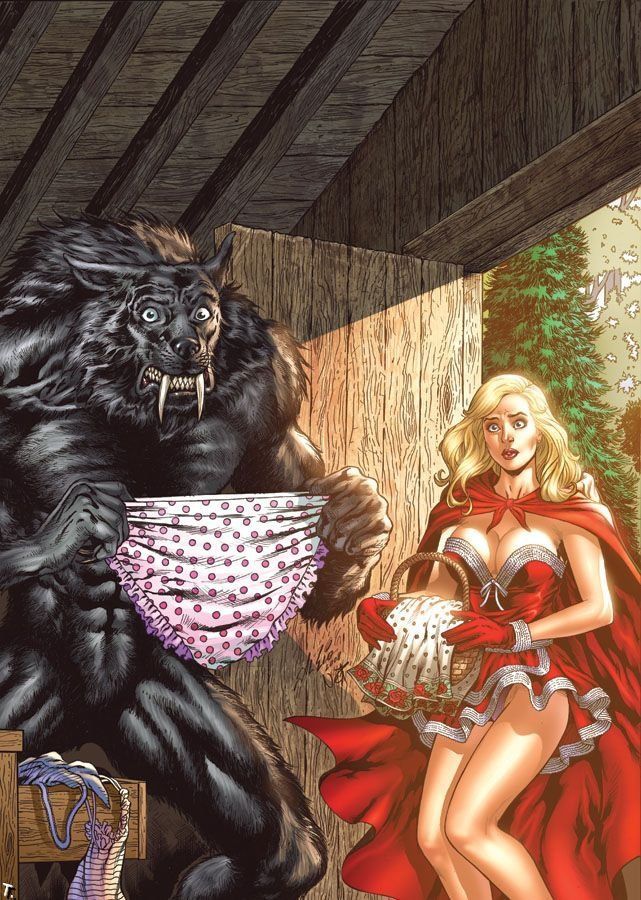
- Set page margins to zero if you have trouble fitting the template on one page (FILE, PAGE SETUP or FILE, PRINTER SETUP in most browsers).
Template Page 1 (color) or (B&W)
Template Page 2 (color) or (B&W)
Template Page 3 (color) or (B&W)
Template Page 4 (color) or (B&W)
Template Page 5 (color) or (B&W)
Template Page 6 (color) or (B&W)
Template Page 7 (color) or (B&W)
Template Page 8 (color) or (B&W)
Template Page 9 (color) or (B&W)
Template Page 10 (color) or (B&W)
Little Red Riding Hood
Little Red Riding Hoodtranslated and/or edited by
D.
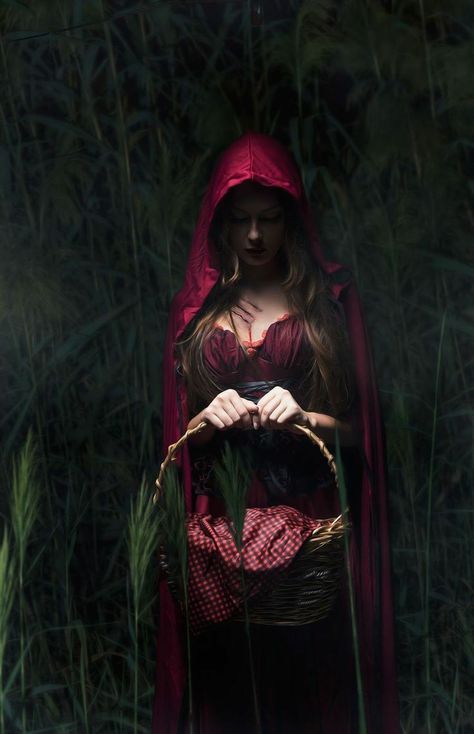 L. Ashliman
L. Ashliman© 1999-2021
- Little Red Riding Hood (Charles Perrault).
- Little Red Cap (Jacob and Wilhelm Grimm).
- Little Red Hood (Germany/Poland).
- Little Red Hat (Italy/Austria).
- The Grandmother (France).
- The True History of Little Golden-Hood (Charles Marelles).
- Red Ridinghood (Ireland).
- The Little Girl and Her Grandmother (Ireland).
- Red Riding Hood (Ireland).
- The Old Man and the Wolf (Romania).
- The Tale of Jemima Puddle-Duck (Beatrix Potter).
- Links to additional texts and related sites.
Return to D. L. Ashliman's folktexts, a library of folktales, folklore, fairy tales, and mythology.
Charles Perrault
Once upon a time there lived in a certain village a little country girl, the prettiest creature who was ever seen. Her mother was excessively fond of her; and her grandmother doted on her still more. This good woman had a little red riding hood made for her.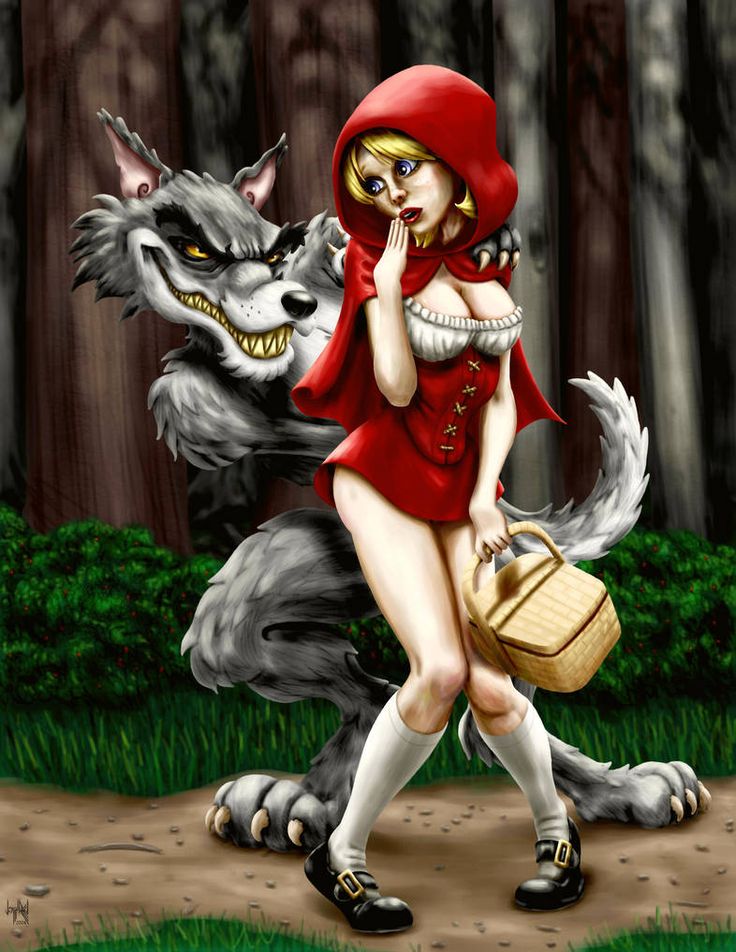 It suited the girl so extremely well that everybody called her Little Red Riding Hood.
It suited the girl so extremely well that everybody called her Little Red Riding Hood. One day her mother, having made some cakes, said to her, "Go, my dear, and see how your grandmother is doing, for I hear she has been very ill. Take her a cake, and this little pot of butter."
Little Red Riding Hood set out immediately to go to her grandmother, who lived in another village.
As she was going through the wood, she met with a wolf, who had a very great mind to eat her up, but he dared not, because of some woodcutters working nearby in the forest. He asked her where she was going. The poor child, who did not know that it was dangerous to stay and talk to a wolf, said to him, "I am going to see my grandmother and carry her a cake and a little pot of butter from my mother."
"Does she live far off?" said the wolf
"Oh I say," answered Little Red Riding Hood; "it is beyond that mill you see there, at the first house in the village."
"Well," said the wolf, "and I'll go and see her too. I'll go this way and go you that, and we shall see who will be there first."
I'll go this way and go you that, and we shall see who will be there first."
The wolf ran as fast as he could, taking the shortest path, and the little girl took a roundabout way, entertaining herself by gathering nuts, running after butterflies, and gathering bouquets of little flowers. It was not long before the wolf arrived at the old woman's house. He knocked at the door: tap, tap.
"Who's there?"
"Your grandchild, Little Red Riding Hood," replied the wolf, counterfeiting her voice; "who has brought you a cake and a little pot of butter sent you by mother."
The good grandmother, who was in bed, because she was somewhat ill, cried out, "Pull the bobbin, and the latch will go up."
The wolf pulled the bobbin, and the door opened, and then he immediately fell upon the good woman and ate her up in a moment, for it been more than three days since he had eaten. He then shut the door and got into the grandmother's bed, expecting Little Red Riding Hood, who came some time afterwards and knocked at the door: tap, tap.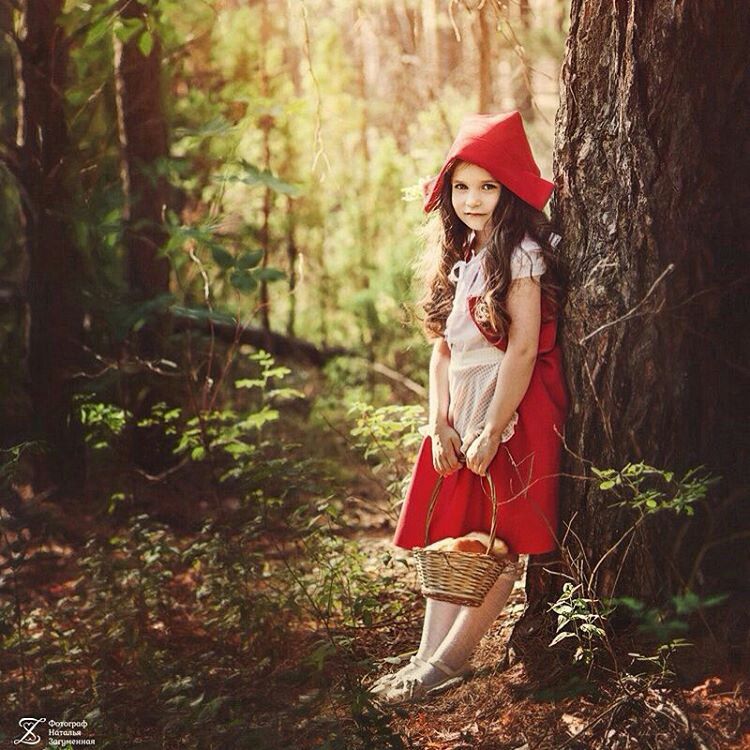
"Who's there?"
Little Red Riding Hood, hearing the big voice of the wolf, was at first afraid; but believing her grandmother had a cold and was hoarse, answered, "It is your grandchild Little Red Riding Hood, who has brought you a cake and a little pot of butter mother sends you."
The wolf cried out to her, softening his voice as much as he could, "Pull the bobbin, and the latch will go up."
Little Red Riding Hood pulled the bobbin, and the door opened.
The wolf, seeing her come in, said to her, hiding himself under the bedclothes, "Put the cake and the little pot of butter upon the stool, and come get into bed with me."
Little Red Riding Hood took off her clothes and got into bed. She was greatly amazed to see how her grandmother looked in her nightclothes, and said to her, "Grandmother, what big arms you have!"
"All the better to hug you with, my dear."
"Grandmother, what big legs you have!"
"All the better to run with, my child.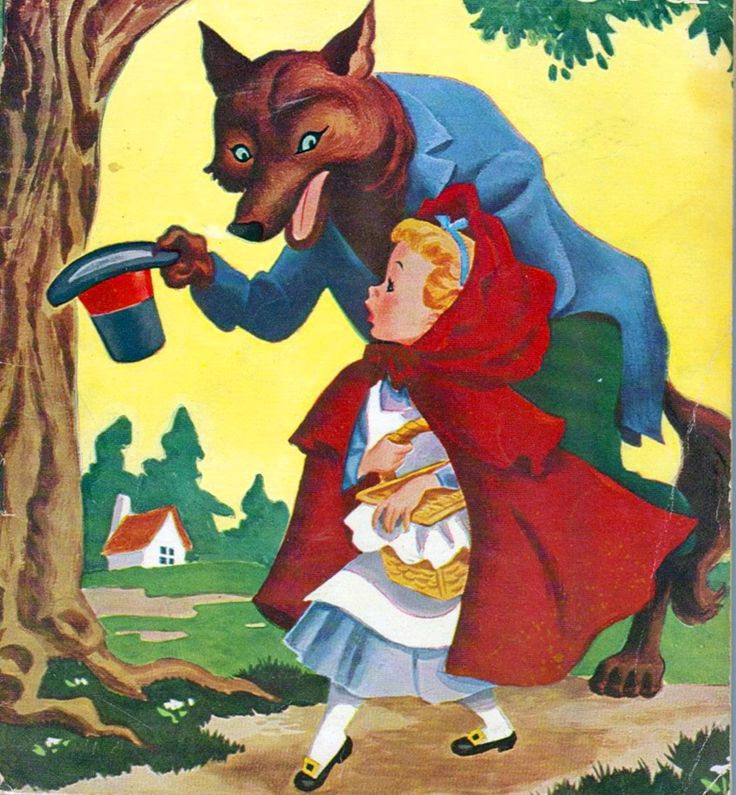 "
"
"Grandmother, what big ears you have!"
"All the better to hear with, my child."
"Grandmother, what big eyes you have!"
"All the better to see with, my child."
"Grandmother, what big teeth you have got!"
"All the better to eat you up with."
And, saying these words, this wicked wolf fell upon Little Red Riding Hood, and ate her all up.
Moral: Children, especially attractive, well bred young ladies, should never talk to strangers, for if they should do so, they may well provide dinner for a wolf. I say "wolf," but there are various kinds of wolves. There are also those who are charming, quiet, polite, unassuming, complacent, and sweet, who pursue young women at home and in the streets. And unfortunately, it is these gentle wolves who are the most dangerous ones of all.
- Source: Andrew Lang, The Blue Fairy Book, 5th edition (London: Longmans, Green, and Company, 1891), pp. 51-53. Lang's source: Charles Perrault, Histoires ou contes du temps passé, avec des moralités: Contes de ma mère l'Oye (Paris, 1697).
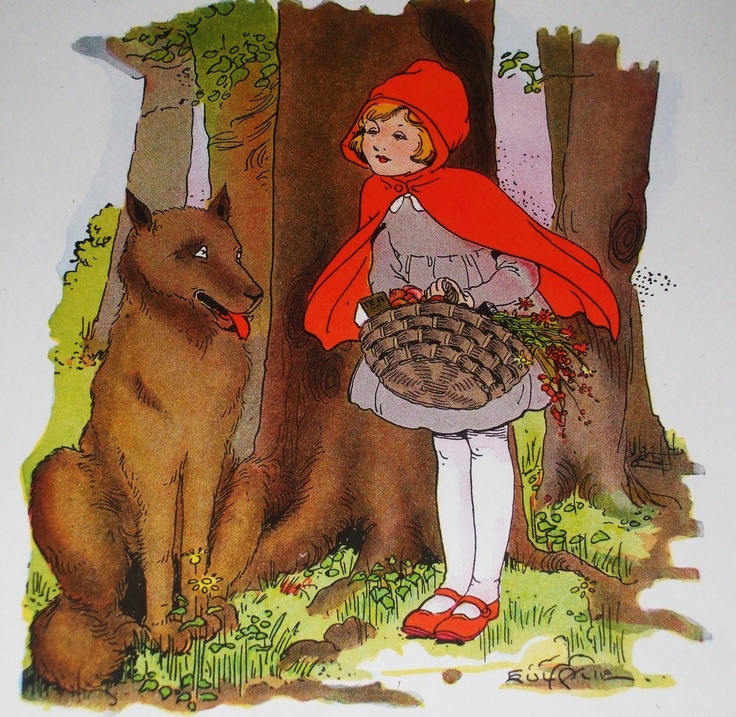
- The French title of this famous tale is "Le Petit Chaperon rouge."
- Link to a French-language text of Le Petit Chaperon rouge.
- Link to D. L. Ashliman's home page for Charles Perrault's Mother Goose Tales.
- Return to the table of contents
Jacob and Wilhelm Grimm
Once upon a time there was a sweet little girl. Everyone who saw her liked her, but most of all her grandmother, who did not know what to give the child next. Once she gave her a little cap made of red velvet. Because it suited her so well, and she wanted to wear it all the time, she came to be known as Little Red Cap.One day her mother said to her, "Come Little Red Cap. Here is a piece of cake and a bottle of wine. Take them to your grandmother. She is sick and weak, and they will do her well. Mind your manners and give her my greetings. Behave yourself on the way, and do not leave the path, or you might fall down and break the glass, and then there will be nothing for your sick grandmother.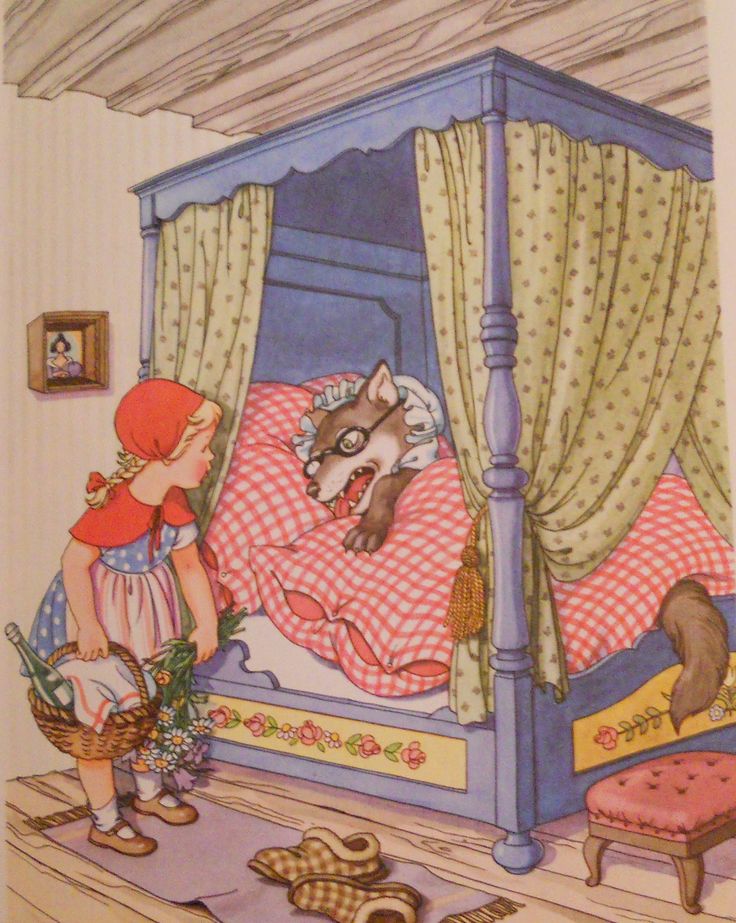 "
"
Little Red Cap promised to obey her mother. The grandmother lived out in the woods, a half hour from the village. When Little Red Cap entered the woods a wolf came up to her. She did not know what a wicked animal he was, and was not afraid of him.
"Good day to you, Little Red Cap."
"Thank you, wolf."
"Where are you going so early, Little Red Cap?"
"To grandmother's."
"And what are you carrying under your apron?"
"Grandmother is sick and weak, and I am taking her some cake and wine. We baked yesterday, and they should give her strength."
"Little Red Cap, just where does your grandmother live?"
"Her house is a good quarter hour from here in the woods, under the three large oak trees. There's a hedge of hazel bushes there. You must know the place," said Little Red Cap.
The wolf thought to himself, "Now there is a tasty bite for me. Just how are you going to catch her?" Then he said, "Listen, Little Red Cap, haven't you seen the beautiful flowers that are blossoming in the woods? Why don't you go and take a look? And I don't believe you can hear how beautifully the birds are singing.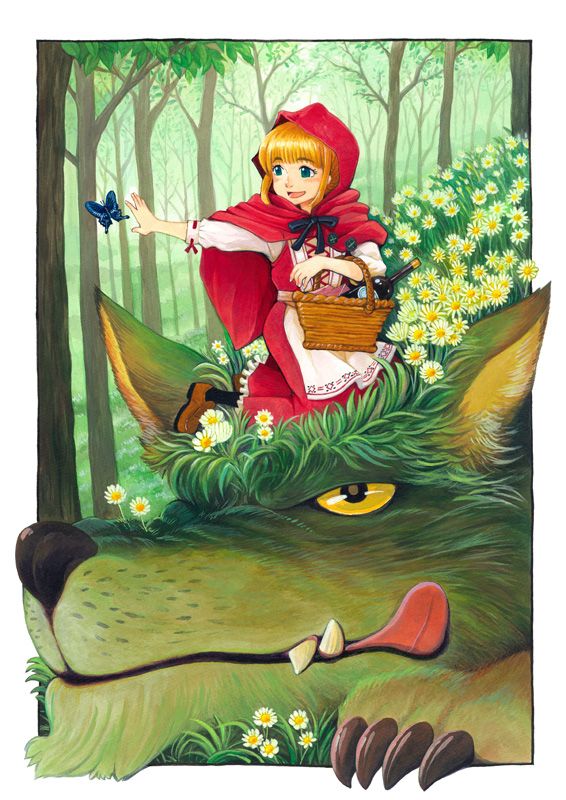 You are walking along as though you were on your way to school in the village. It is very beautiful in the woods."
You are walking along as though you were on your way to school in the village. It is very beautiful in the woods."
Little Red Cap opened her eyes and saw the sunlight breaking through the trees and how the ground was covered with beautiful flowers. She thought, "If a take a bouquet to grandmother, she will be very pleased. Anyway, it is still early, and I'll be home on time." And she ran off into the woods looking for flowers. Each time she picked one she thought that she could see an even more beautiful one a little way off, and she ran after it, going further and further into the woods. But the wolf ran straight to the grandmother's house and knocked on the door.
"Who's there?"
"Little Red Cap. I'm bringing you some cake and wine. Open the door for me."
"Just press the latch," called out the grandmother. "I'm too weak to get up."
The wolf pressed the latch, and the door opened. He stepped inside, went straight to the grandmother's bed, and ate her up.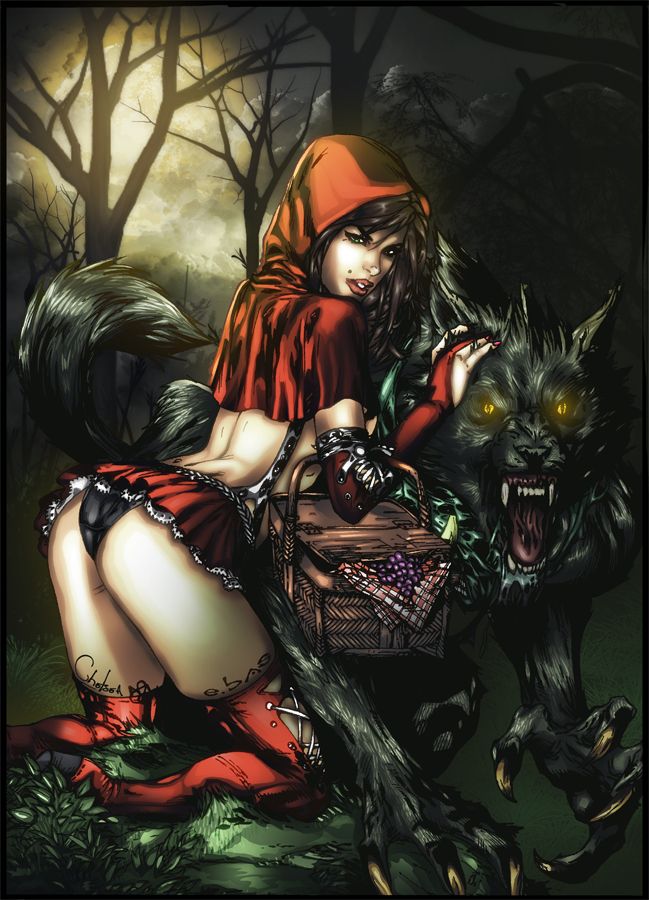 Then he took her clothes, put them on, and put her cap on his head. He got into her bed and pulled the curtains shut.
Then he took her clothes, put them on, and put her cap on his head. He got into her bed and pulled the curtains shut.
Little Red Cap had run after flowers, and did not continue on her way to grandmother's until she had gathered all that she could carry. When she arrived, she found, to her surprise, that the door was open. She walked into the parlor, and everything looked so strange that she thought, "Oh, my God, why am I so afraid? I usually like it at grandmother's." Then she went to the bed and pulled back the curtains. Grandmother was lying there with her cap pulled down over her face and looking very strange.
"Oh, grandmother, what big ears you have!"
"All the better to hear you with."
"Oh, grandmother, what big eyes you have!"
"All the better to see you with."
"Oh, grandmother, what big hands you have!"
"All the better to grab you with!"
"Oh, grandmother, what a horribly big mouth you have!"
"All the better to eat you with!" And with that he jumped out of bed, jumped on top of poor Little Red Cap, and ate her up.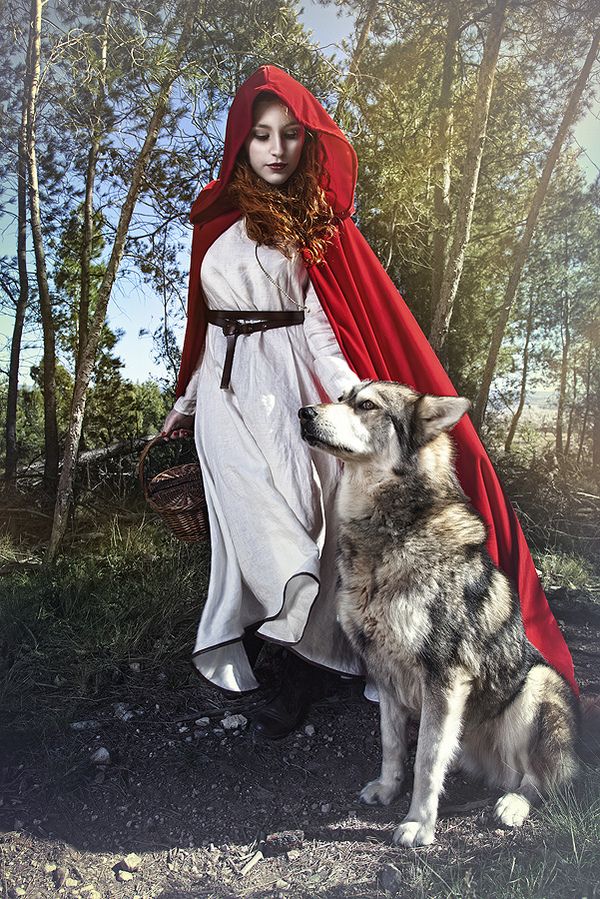 As soon as the wolf had finished this tasty bite, he climbed back into bed, fell asleep, and began to snore very loudly.
As soon as the wolf had finished this tasty bite, he climbed back into bed, fell asleep, and began to snore very loudly.
A huntsman was just passing by. He thought it strange that the old woman was snoring so loudly, so he decided to take a look. He stepped inside, and in the bed there lay the wolf that he had been hunting for such a long time. "He has eaten the grandmother, but perhaps she still can be saved. I won't shoot him," thought the huntsman. So he took a pair of scissors and cut open his belly.
He had cut only a few strokes when he saw the red cap shining through. He cut a little more, and the girl jumped out and cried, "Oh, I was so frightened! It was so dark inside the wolf's body!"
And then the grandmother came out alive as well. Then Little Red Cap fetched some large heavy stones. They filled the wolf's body with them, and when he woke up and tried to run away, the stones were so heavy that he fell down dead.
The three of them were happy. The huntsman took the wolf's pelt.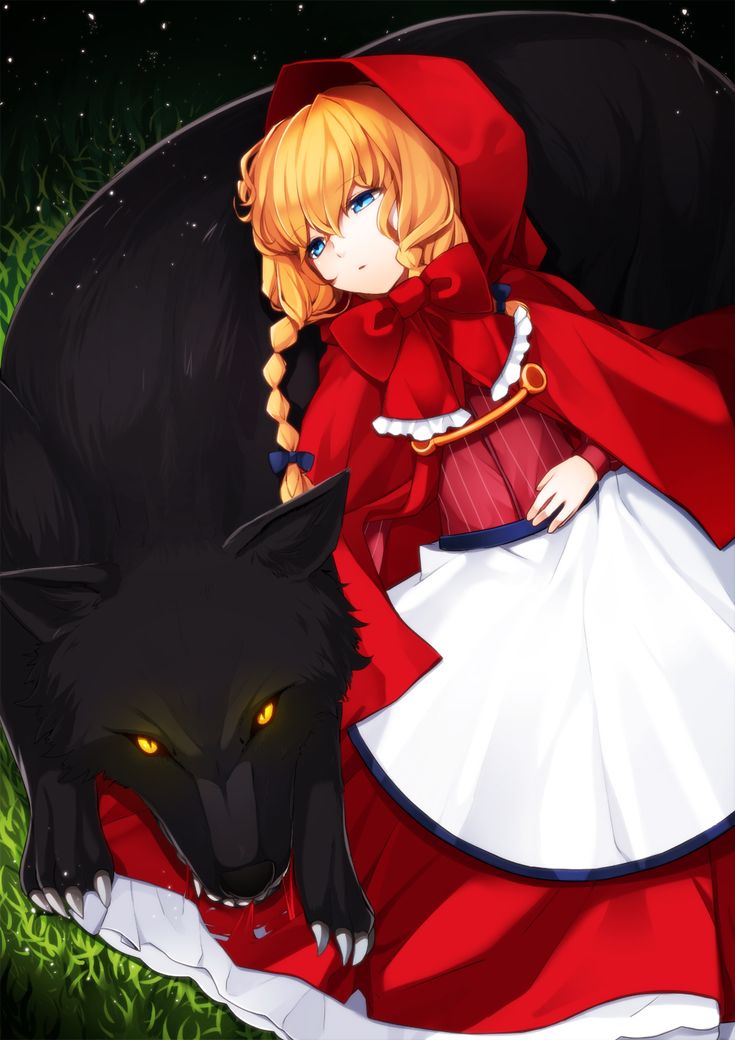 The grandmother ate the cake and drank the wine that Little Red Cap had brought. And Little Red Cap thought to herself, "As long as I live, I will never leave the path and run off into the woods by myself if mother tells me not to."
The grandmother ate the cake and drank the wine that Little Red Cap had brought. And Little Red Cap thought to herself, "As long as I live, I will never leave the path and run off into the woods by myself if mother tells me not to."
They also tell how Little Red Cap was taking some baked things to her grandmother another time, when another wolf spoke to her and wanted her to leave the path. But Little Red Cap took care and went straight to grandmother's. She told her that she had seen the wolf, and that he had wished her a good day, but had stared at her in a wicked manner. "If we hadn't been on a public road, he would have eaten me up," she said.
"Come," said the grandmother. "Let's lock the door, so he can't get in."
Soon afterward the wolf knocked on the door and called out, "Open up, grandmother. It's Little Red Cap, and I'm bringing you some baked things."
They remained silent, and did not open the door. The wicked one walked around the house several times, and finally jumped onto the roof. He wanted to wait until Little Red Cap went home that evening, then follow her and eat her up in the darkness. But the grandmother saw what he was up to. There was a large stone trough in front of the house.
He wanted to wait until Little Red Cap went home that evening, then follow her and eat her up in the darkness. But the grandmother saw what he was up to. There was a large stone trough in front of the house.
"Fetch a bucket, Little Red Cap," she said. "Yesterday I cooked some sausage. Carry the water that I boiled them with to the trough." Little Red Cap carried water until the large, large trough was clear full. The smell of sausage arose into the wolf's nose. He sniffed and looked down, stretching his neck so long that he could no longer hold himself, and he began to slide. He slid off the roof, fell into the trough, and drowned. And Little Red Cap returned home happily and safely.
- Source: "Rothkäppchen," Kinder- und Hausmärchen, 1st ed. (Berlin: Realschulbuchhandlung, 1812), v. 1, no. 26, pp. 113-18. Translated by D. L. Ashliman.
- The Grimms' source for the first variant (the main story) was Jeanette Hassenpflug (1791-1860). Marie Hassenpflug (1788-1856) provided them with the second variant (the concluding episode, introduced with the sentence "They also tell how Little Red Cap was taking some baked things to her grandmother another time.
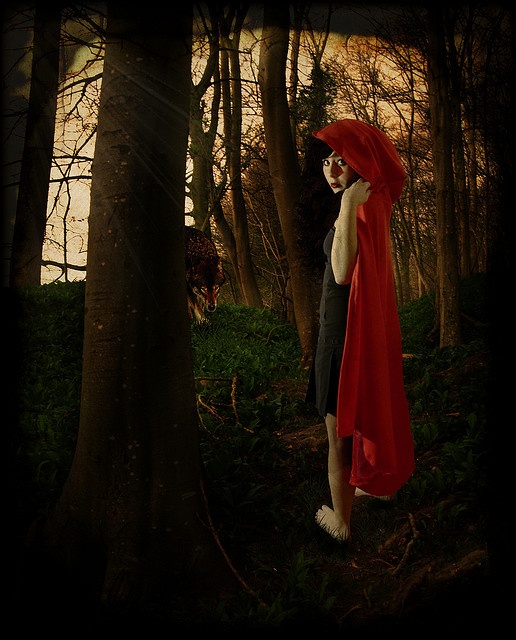 ..."
..." - The German title of this tale is Rotkäppchen (Rothkäppchen in the nineteenth-century spelling of the Grimm brothers).
- Link to an English translation of the Grimms' final version (edition of 1857) of Little Red Cap.
- Link to the German text of the Grimms' final version: "Rothkäppchen," Kinder- und Hausmärchen, gesammelt durch die Brüder Grimm, 7th edition, vol. 1 (Göttingen: Verlag der Dieterichschen Buchhandlung, 1857), no. 26, pp. 140-44.
- Link to the Grimm Brothers Home Page.
- Return to the table of contents.
Lower Lusatia
Once upon a time, there was a little darling damsel, whom everybody loved that looked upon her, but her old granny loved her best of all, and didn't know what to give the dear child for love. Once she made her a hood of red samite, and since that became her so well, and she, too, would wear nothing else on her head, people gave her the name of "Red Hood." Once her mother said to Red Hood, "Go; here is a slice of cake and a bottle of wine; carry them to old granny.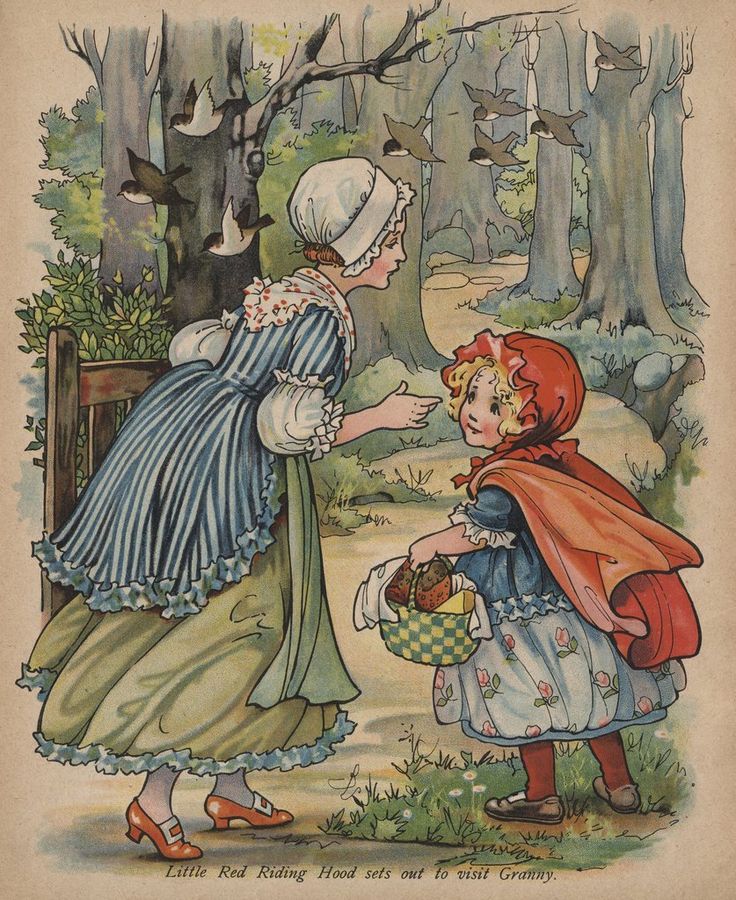 She is ill and weak, and they will refresh her. But be pretty behaved, and don't peep about in all corners when you come into her room, and don't forget to say 'Good-day.' Walk, too, prettily, and don't go out of the road, otherwise you will fall and break the bottle, and then poor granny will have nothing."
She is ill and weak, and they will refresh her. But be pretty behaved, and don't peep about in all corners when you come into her room, and don't forget to say 'Good-day.' Walk, too, prettily, and don't go out of the road, otherwise you will fall and break the bottle, and then poor granny will have nothing."
Red Hood said, "I will observe everything well that you have told me," and gave her mother her hand upon it.
But granny lived out in a forest, half an hour's walk from the village. When Red Hood went into the forest, she met a wolf. But she did not know what a wicked beast he was, and was not afraid of him.
"God help you, Red Hood!" said he.
"God bless you, wolf!" replied she.
"Whither so early, Red Hood?"
"To granny."
"What have you there under your mantle?"
"Cake and wine. We baked yesterday; old granny must have a good meal for once, and strengthen herself therewith."
"Where does your granny live, Red Hood?"
"A good quarter of an hour's walk further in the forest, under yon three large oaks.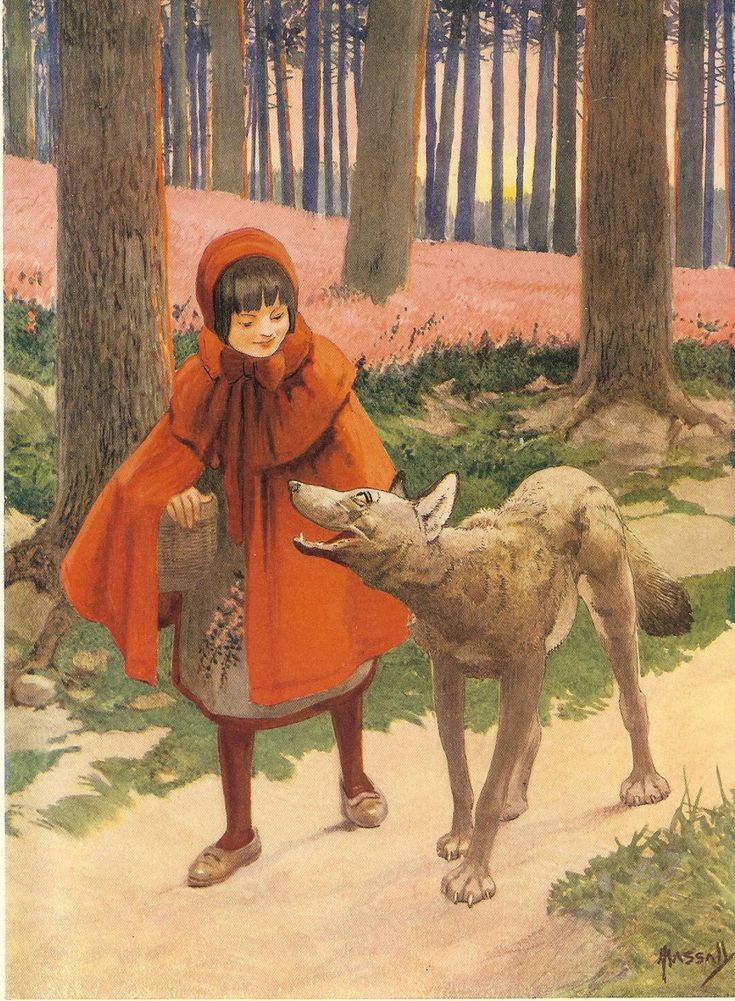 There stands her house; further beneath are the nut trees, which you will see there," said Red Hood.
There stands her house; further beneath are the nut trees, which you will see there," said Red Hood.
The wolf thought within himself, "This nice young damsel is a rich morsel. She will taste better than the old woman; but you must trick her cleverly, that you may catch both."
For a time he went by Red Hood's side Then said he, "Red Hood! Just look! There are such pretty flowers here! Why don't you look round at them all? Methinks you don't even hear how delightfully the birds are singing! You are as dull as if you were going to school, and yet it is so cheerful in the forest!"
Little Red Hood lifted up her eyes, and when she saw how the sun's rays glistened through the tops of the trees, and every place was full of flowers, she bethought herself, "If I bring with me a sweet smelling nosegay to granny, it will cheer her. It is still so early, that I shall come to her in plenty of time," and therewith she skipped into the forest and looked for flowers.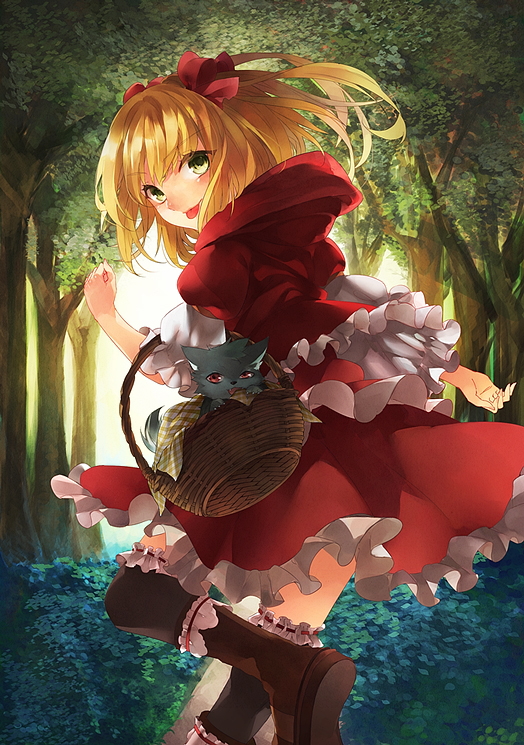 And when she had plucked one, she fancied that another further off was nicer, and ran there, and went always deeper and deeper into the forest.
And when she had plucked one, she fancied that another further off was nicer, and ran there, and went always deeper and deeper into the forest.
But the wolf went by the straight road to old granny's, and knocked at the door.
"Who's there?"
"Little Red Hood, who has brought cake and wine. Open!"
"Only press the latch," cried granny. "I am so weak that I cannot stand."
The wolf pressed the latch, walked in, and went without saying a word straight to granny's bed and ate her up. Then he took her clothes, dressed himself in them, put her cap on his head, lay down in her bed and drew the curtains.
Meanwhile little Red Hood was running after flowers, and when she had so many that she could not carry any more, she bethought her of her granny, and started on the way to her. It seemed strange to her that the door was wide open, and when she entered the room everything seemed to her so peculiar, that she thought, "Ah! My God! How strange I feel today, and yet at other times I am so glad to be with granny!"
She said, "Good-day!" but received no answer.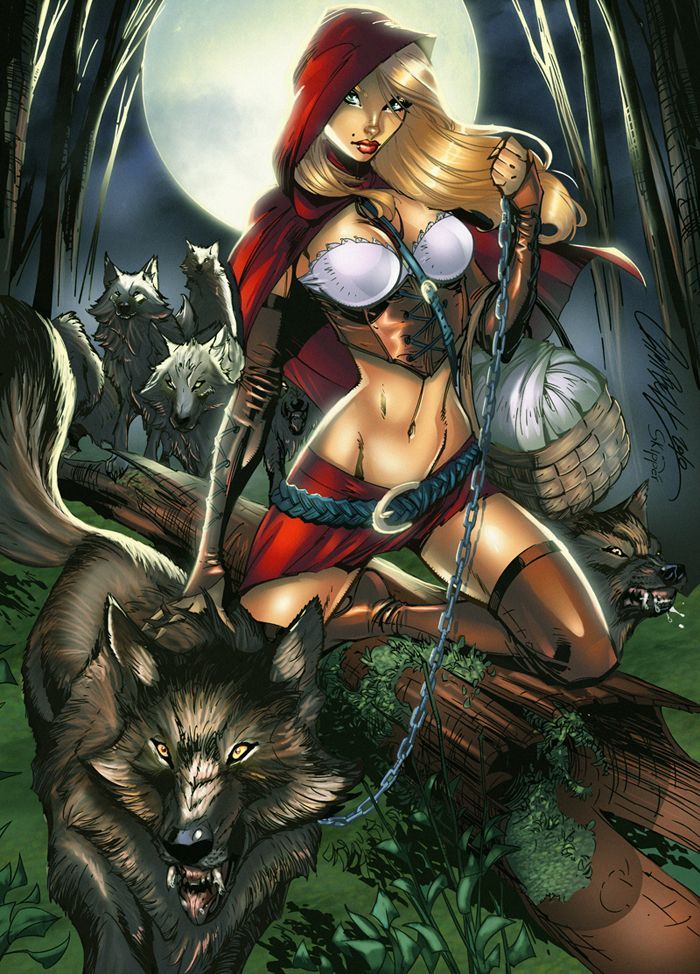
Thereupon she went to the bed and undrew the curtains. There lay granny, with her cap drawn down to her eyes, and looking so queer!
"Ah, granny! Why have you such long ears?"
"The better to hear you."
"Ah, granny! Why have you such large eyes?"
"The better to see you."
"Ah, granny! Why have you such large hands?"
"The better to take hold of you."
"But, granny! Why have you such a terribly large mouth?"
"The better to eat you up!"
And therewith the wolf sprang out of bed at once on poor little Red Hood, and ate her up. When the wolf had satisfied his appetite, he lay down again in the bed, and began to snore tremendously.
A huntsman came past, and bethought himself, "How can an old woman snore like that? I'll just have a look to see what it is."
He went into the room, and looked into the bed; there lay the wolf. "Have I found you now, old rascal?" said he. "I've long been looking for you.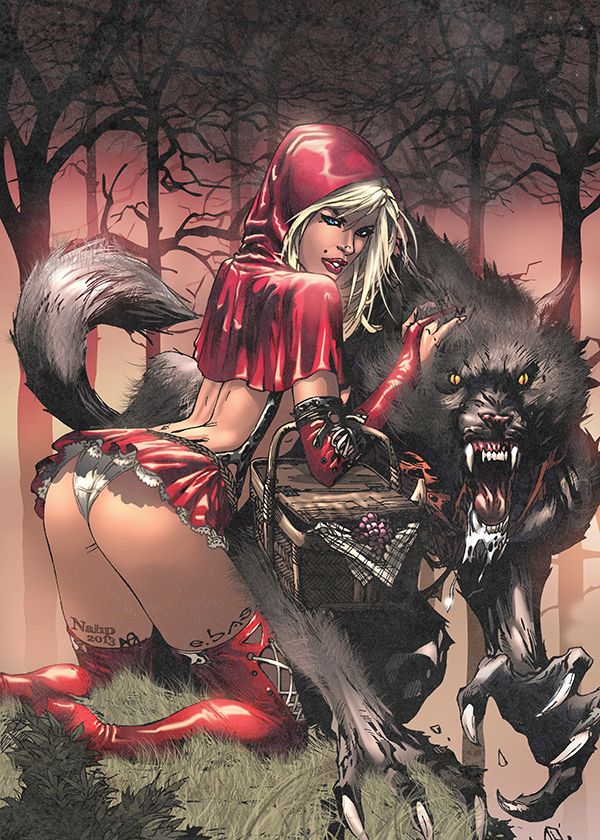 "
"
He was just going to take aim with his gun, when he bethought himself, "Perhaps the wolf has only swallowed granny, and she may yet be released."
Therefore he did not shoot, but took a knife and began to cut open the sleeping wolf's maw. When he had made several cuts, he saw a red hood gleam, and after one or two more cuts out skipped Red Hood, and cried, "Oh, how frightened I have been; it was so dark in the wolf's maw!"
Afterwards out came old granny, still alive, but scarcely able to breathe. But Red Hood made haste and fetched large stones, with which they filled the wolf's maw, and when he woke he wanted to jump up and run away, but the stones were so heavy that he fell on the ground and beat himself to death.
Now, they were all three merry. The huntsman took off the wolf's skin; granny ate the cake and drank the wine which little Red Hood had brought, and became strong and well again; and little Red Hood thought to herself, "As long as I live, I won't go out of the road into the forest, when mother has forbidden me.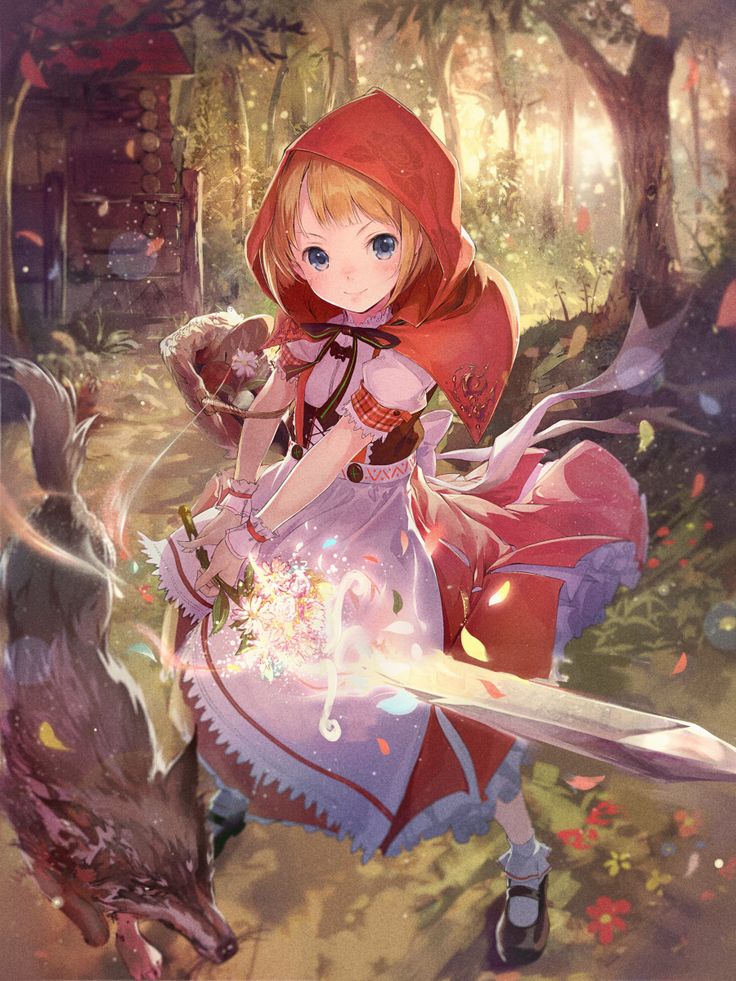 "
"
- Source: A. H. Wratislaw, Sixty Folk-Tales from Exclusively Slavonic Sources (London: Elliot Stock, 1889), no. 15, pp. 97-100.
- Lower Lusatia (German Niederlausitz, Polish Dolne Łużyce) is a mixed German and Slavic historical and cultural region in today's eastern German and western Poland.
- Note by Wratslaw:
"Little Red Hood," like many folklore tales, is a singular mixture of myth and morality. In Cox's Comparative Mythology, vol. ii., p. 831, note, Little Redcap, or Little Red Riding Hood, is interpreted as "the evening with her scarlet robe of twilight," who is swallowed up by the wolf of darkness, the Fenris of the Edda. It appears to me that this explanation may suit the color of her cap or hood, but is at variance with the other incidents of the story. I am inclined to look upon the tale as a lunar legend, although the moon is only actually red during one portion of the year, at the harvest moon in the autumn.
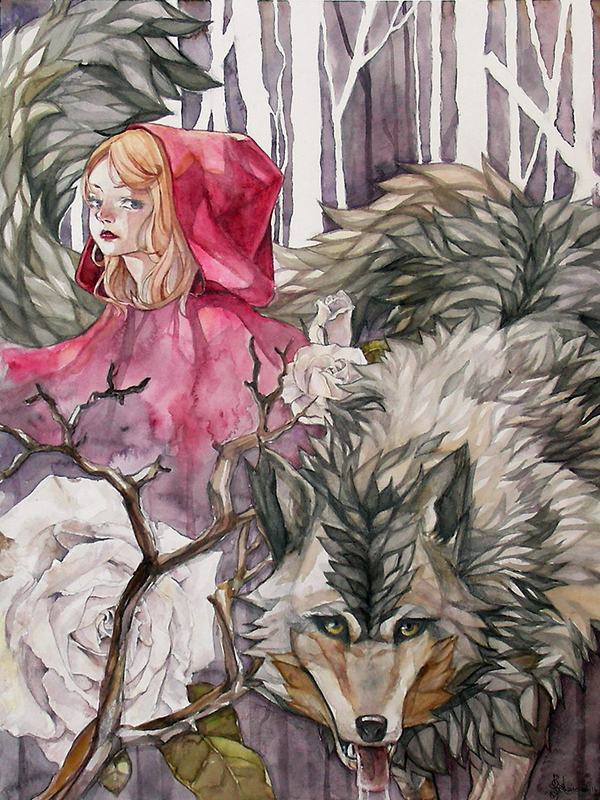 Red Hood is represented as wandering, like Io, who is undoubtedly the moon, through trees, the clouds, and flowers, the stars, before she reaches the place where she is intercepted by the wolf. An eclipse to untutored minds would naturally suggest the notion that some evil beast was endeavoring to devour the moon, who is afterwards rescued by the sun, the archer of the heavens, whose bow and arrow are by a common anachronism represented in the story by a gun. Though the moon is masculine in Slavonic, as in German, yet she is a lady, "my lady Luna," in the Croatian legend no. 53, below ["The Daughter of the King of the Vilas"]. In the Norse mythology, when Loki is let loose at the end of the world, he is to "hurry in the form of a wolf to swallow the moon " (Cox ii., p. 200). The present masculine Slavonic word for moon, which is also that for month, mesic, or mesec, is a secondary formation, the original word having perished. In Greek and Latin the moon is always feminine.
Red Hood is represented as wandering, like Io, who is undoubtedly the moon, through trees, the clouds, and flowers, the stars, before she reaches the place where she is intercepted by the wolf. An eclipse to untutored minds would naturally suggest the notion that some evil beast was endeavoring to devour the moon, who is afterwards rescued by the sun, the archer of the heavens, whose bow and arrow are by a common anachronism represented in the story by a gun. Though the moon is masculine in Slavonic, as in German, yet she is a lady, "my lady Luna," in the Croatian legend no. 53, below ["The Daughter of the King of the Vilas"]. In the Norse mythology, when Loki is let loose at the end of the world, he is to "hurry in the form of a wolf to swallow the moon " (Cox ii., p. 200). The present masculine Slavonic word for moon, which is also that for month, mesic, or mesec, is a secondary formation, the original word having perished. In Greek and Latin the moon is always feminine.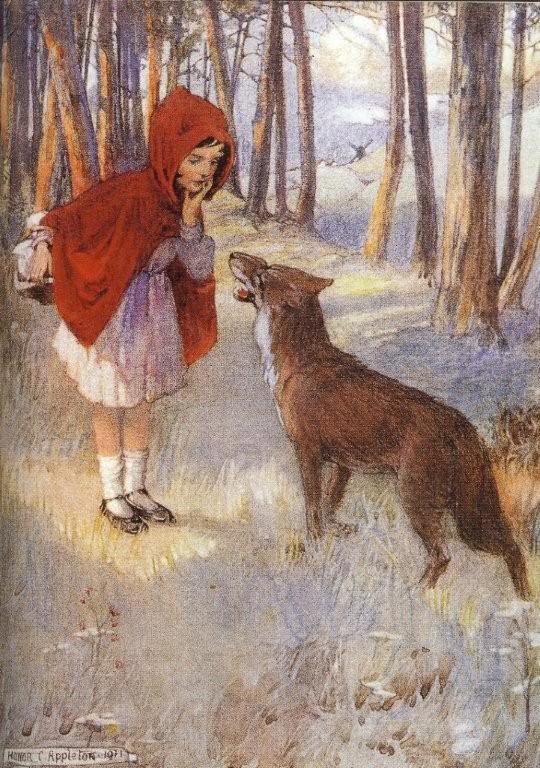
- Return to the table of contents.
Italy/Austria
Once there was an old woman who had a granddaughter named Little Red Hat. One day they were both in the field when the old woman said, "I am going home now. You come along later and bring me some soup."After a while Little Red Hat set out for her grandmother's house, and she met an ogre, who said, "Hello, my dear Little Red Hat. Where are you going?"
"I am going to my grandmother's to take her some soup."
"Good," he replied, "I'll come along too. Are you going across the stones or the thorns?"
"I'm going across the stones," said the girl.
"Then I'll go across the thorns," replied the ogre.
They left. But on the way Little Red Hat came to a meadow where beautiful flowers of all colors were in bloom, and the girl picked as many as her heart desired. Meanwhile the ogre hurried on his way, and although he had to cross the thorns, he arrived at the house before Little Red Hat.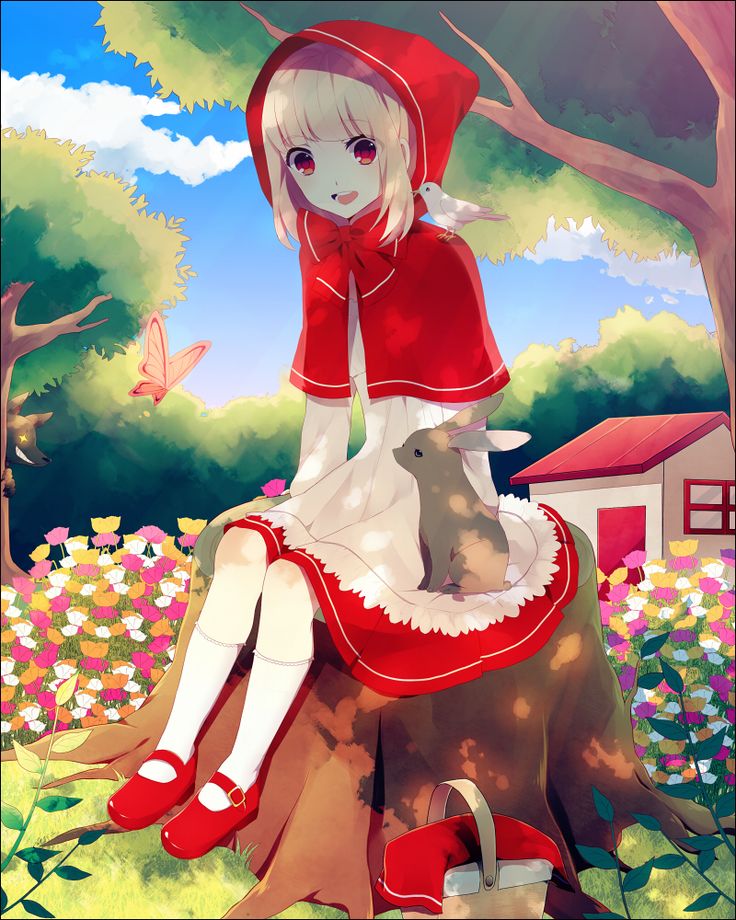 He went inside, killed the grandmother, ate her up, and climbed into her bed. He also tied her intestine onto the door in place of the latch string and placed her blood, teeth, and jaws in the kitchen cupboard.
He went inside, killed the grandmother, ate her up, and climbed into her bed. He also tied her intestine onto the door in place of the latch string and placed her blood, teeth, and jaws in the kitchen cupboard.
He had barely climbed into bed when Little Red Hat arrived and knocked at the door.
"Come in" called the ogre with a dampened voice.
Little Red Hat tried to open the door, but when she noticed that she was pulling on something soft, she called out, "Grandmother, this thing is so soft!"
"Just pull and keep quiet. It is your grandmother's intestine!"
"What did you say?"
"Just pull and keep quiet!"
Little Red Hat opened the door, went inside, and said, "Grandmother, I am hungry."
The ogre replied, "Go to the kitchen cupboard. There is still a little rice there."
Little Red Hat went to the cupboard and took the teeth out. "Grandmother, these things are very hard!"
"Eat and keep quiet. They are your grandmother's teeth!"
"What did you say?"
"Eat and keep quiet!"
A little while later Little Red Hat said, "Grandmother, I'm still hungry.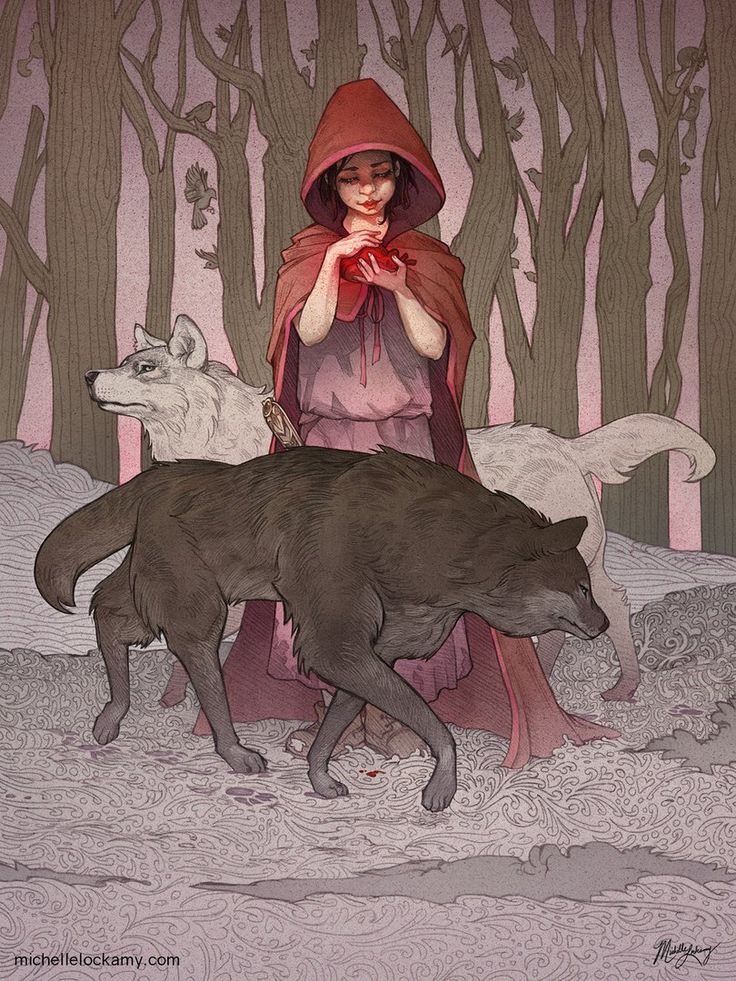 "
"
"Go back to the cupboard," said the ogre. "You will find two pieces of chopped meat there."
Little Red Hat went to the cupboard and took out the jaws. "Grandmother, this is very red!"
"Eat and keep quiet. They are your grandmother's jaws!"
"What did you say?"
"Eat and keep quiet!"
A little while later Little Red Hat said, "Grandmother, I'm thirsty."
"Just look in the cupboard," said the ogre. "There must be a little wine there."
Little Red Hat went to the cupboard and took out the blood. "Grandmother, this wine is very red!"
"Drink and keep quiet. It is your grandmother's blood!
"What did you say?"
"Just drink and keep quiet!"
A little while later Little Red Hat said, "Grandmother, I'm sleepy."
"Take off your clothes and get into bed with me!" replied the ogre.
Little Red Hat got into bed and noticed something hairy. "Grandmother, you are so hairy!"
"That comes with age," said the ogre.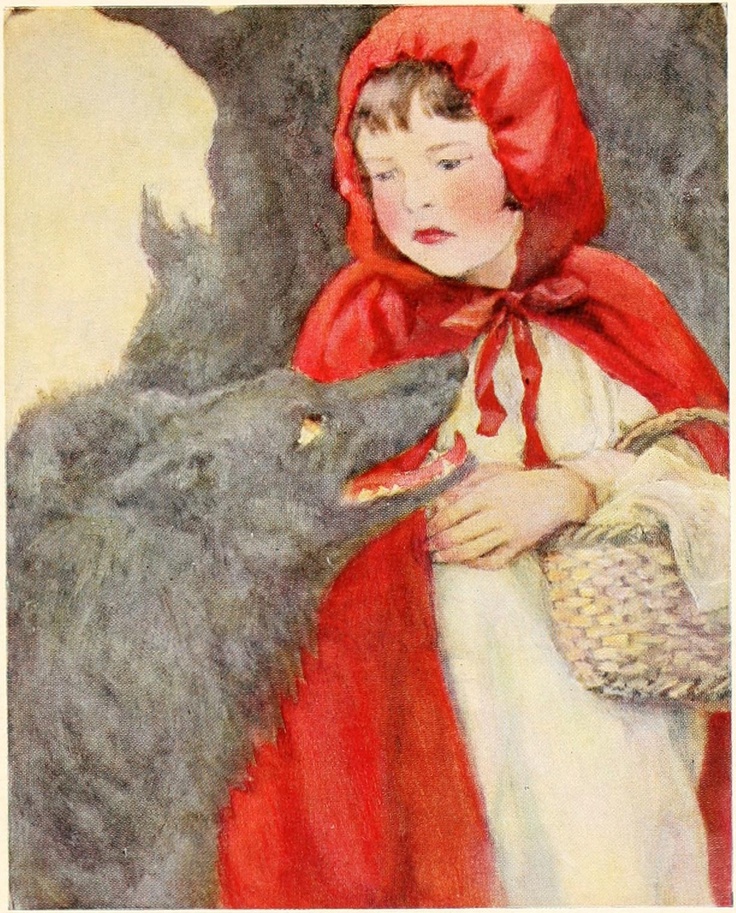
"Grandmother, you have such long legs!"
"That comes from walking."
"Grandmother, you have such long hands!"
"That comes from working."
"Grandmother, you have such long ears!"
"That comes from listening."
"Grandmother, you have such a big mouth!"
"That comes from eating children!" said the ogre, and bam, he swallowed Little Red Hat with one gulp.
- Source: Christian Schneller, "Das Rothhütchen," Märchen und Sagen aus Wälschtirol: Ein Beitrag zur deutschen Sagenkunde (Innsbruck: Verlag der Wagner'schen Universitäts-Buchhandlung, 1867), no. 6, pp. 9-10. Translated by D. L. Ashliman. © 2007.
- The Italian title of this story is "El cappelin rosso."
- Return to the table of contents.
France
There was a woman who had made some bread. She said to her daughter, "Go and carry a hot loaf and a bottle of milk to your grandmother."So the little girl set forth. Where two paths crossed she met the bzou [werewolf], who said to her, "Where are you going?"
"I am carrying a hot loaf and a bottle of milk to my grandmother.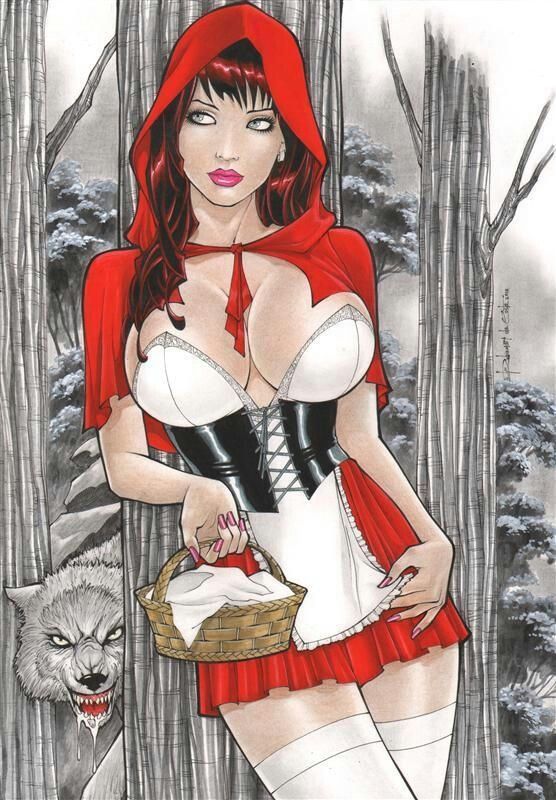 "
"
"Which path are you taking? said the bzou. "The one of needles or the one of pins?"
"The one of needles," said the little girl.
"Good! I am taking the one of pins."
The little girl entertained herself by gathering needles.
The bzou arrived at the grandmother's house and killed her. He put some of her flesh in the pantry and a bottle of her blood on the shelf.
The little girl arrived and knocked at the door. "Push on the door," said the bzou. "It is blocked with a pail of water."
"Good day, grandmother. I have brought you a hot loaf and a bottle of milk."
"Put it in the pantry, my child. Take some of the meat that is there, and the bottle of wine that is on the shelf."
While she was eating, a little cat that was there said, "For shame! The slut is eating her grandmother's flesh and drinking her grandmother's blood."
"Get undressed, my child," said the bzou, and come to bed with me."
"Where should I put my apron?"
"Throw it into the fire.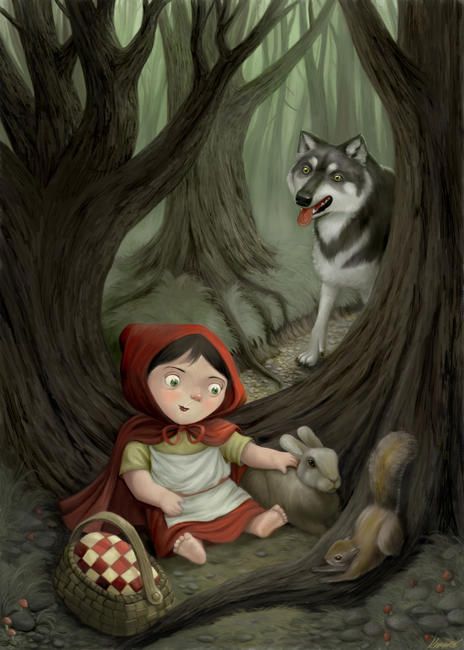 You won't need it anymore."
You won't need it anymore."
And for all her clothes -- her bodice, her dress, her petticoat, and her shoes and stockings -- she asked where she should put them, and the wolf replied, "Throw them into the fire, my child. You won't need them anymore."
When she had gone to bed the little girl said, "Oh, grandmother, how hairy you are!"
"The better to keep myself warm, my child."
"Oh, grandmother, what long nails you have!"
"The better to scratch myself with, my child!"
"Oh, grandmother, what big shoulders you have!"
"The better to carry firewood with, my child!"
"Oh, grandmother, what big ears you have!"
"The better to hear with, my child!"
"Oh, grandmother, what a big nose you have!"
"To better take my tobacco with, my child!"
"Oh, grandmother, what a big mouth you have!"
"The better to eat you with, my child!"
"Oh, grandmother, I have to do it outside!"
"Do it in the bed, my child!"
"Oh no, grandmother, I really have to do it outside.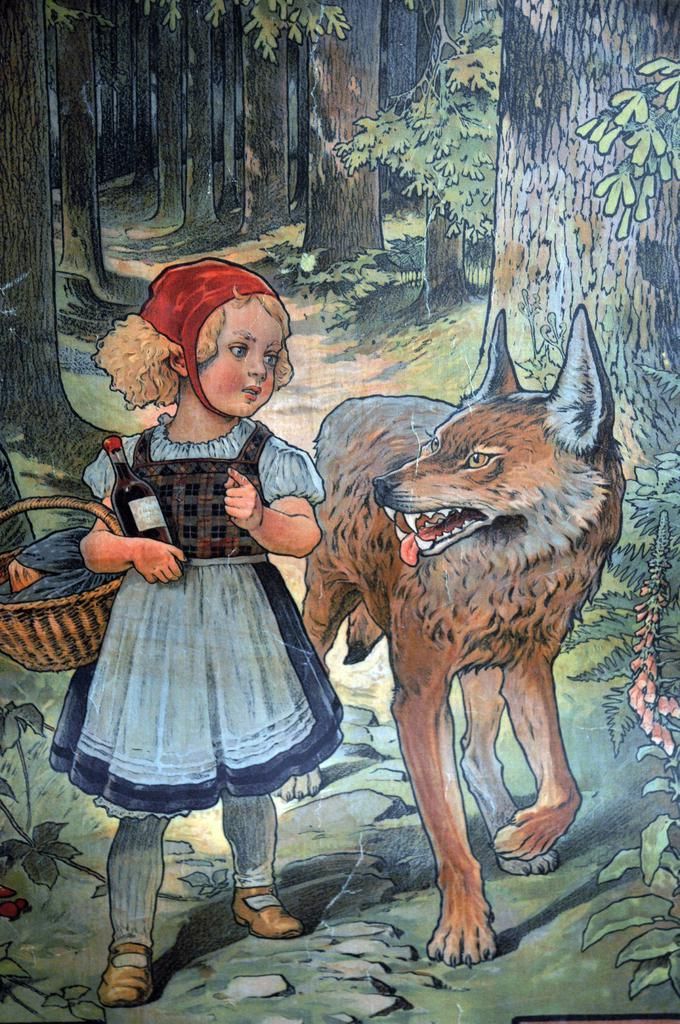 "
"
"All right, but don't take too long."
The bzou tied a woolen thread to her foot and let her go. As soon as the little girl was outside she tied the end of the thread to a plum tree in the yard.
The bzou grew impatient and said, "Are you doing a load? Are you doing a load?"
Not hearing anyone reply, he jumped out of bed and hurried after the little girl, who had escaped. He followed her, but he arrived at her home just as she went inside.
- Source: Conte de la mère-grand, from a website sponsored by the Bibliothèque nationale de France. Translated by D. L. Ashliman. © 2007.
- Collected by folklorist Achille Millien (1838-1927) in the French province of Nivernais, about 1870.
- Return to the table of contents.
Charles Marelles
You know the tale of poor Little Red Riding-Hood, that the wolf deceived and devoured, with her cake, her little butter can, and her grandmother. Well, the true story happened quite differently, as we know now.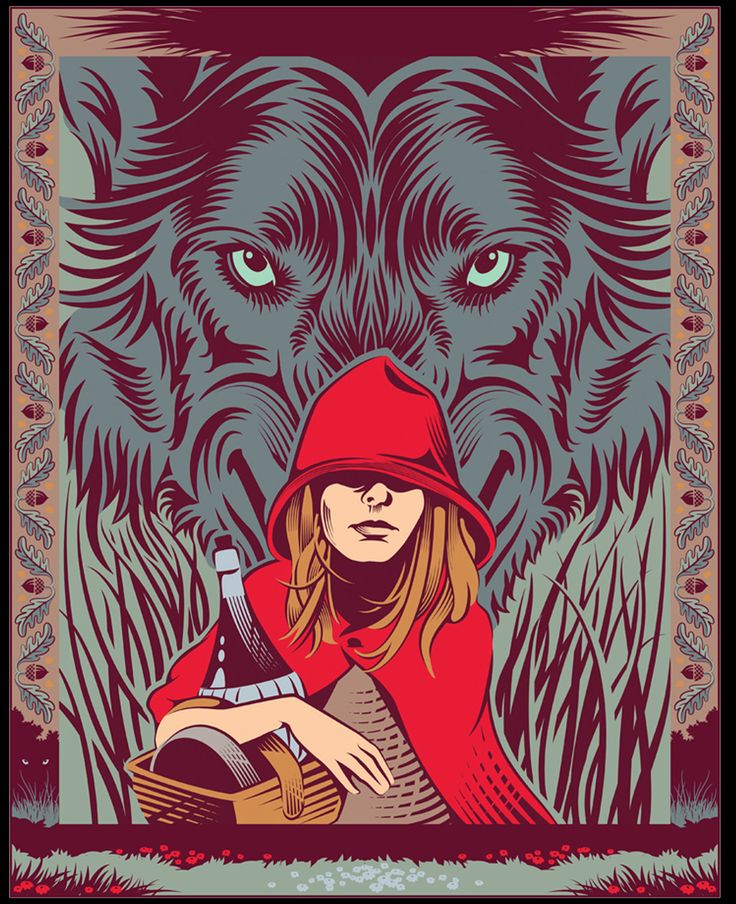 And first of all the little girl was called and is still called Little Golden-Hood; secondly, it was not she, nor the good grand-dame, but the wicked wolf who was, in the end, caught and devoured.
And first of all the little girl was called and is still called Little Golden-Hood; secondly, it was not she, nor the good grand-dame, but the wicked wolf who was, in the end, caught and devoured. Only listen. The story begins something like the tale.
There was once a little peasant girl, pretty and nice as a star in its season. Her real name was Blanchette, but she was more often called Little Golden-Hood, on account of a wonderful little cloak with a hood, gold- and fire-colored, which she always had on. This little hood was given her by her grandmother, who was so old that she did not know her age; it ought to bring her good luck, for it was made of a ray of sunshine, she said. And as the good old woman was considered something of a witch, everyone thought the little hood rather bewitched too.
And so it was, as you will see.
One day the mother said to the child, "Let us see, my Little Golden-Hood, if you know now how to find your way by yourself.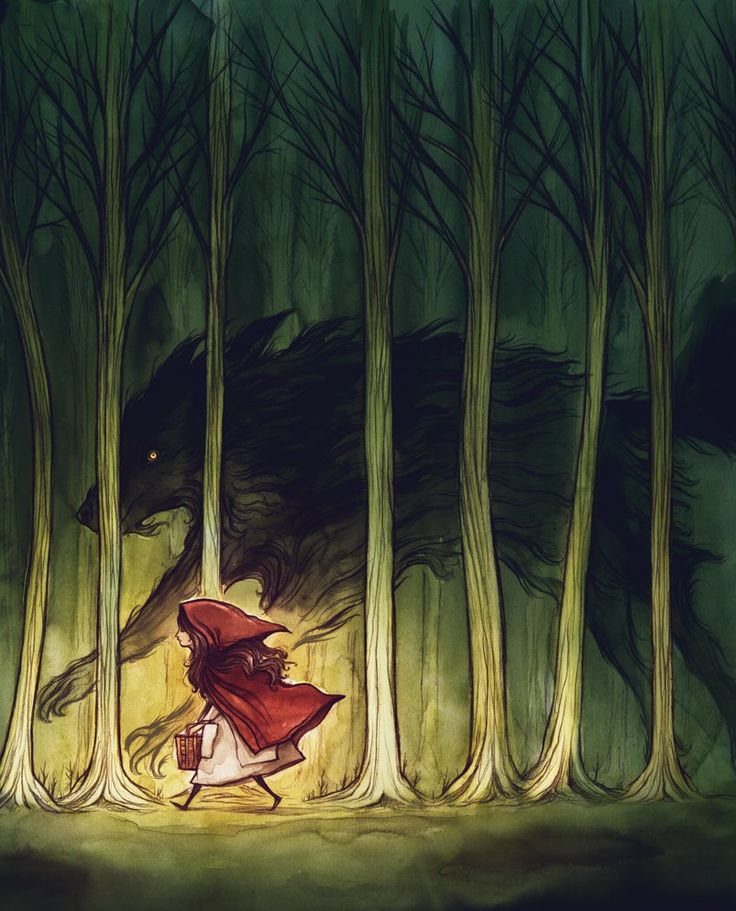 You shall take this good piece of cake to your grandmother for a Sunday treat tomorrow. You will ask her how she is, and come back at once, without stopping to chatter on the way with people you don't know. Do you quite understand?"
You shall take this good piece of cake to your grandmother for a Sunday treat tomorrow. You will ask her how she is, and come back at once, without stopping to chatter on the way with people you don't know. Do you quite understand?"
"I quite understand," replied Blanchette gaily. And off she went with the cake, quite proud of her errand.
But the grandmother lived in another village, and there was a big wood to cross before getting there. At a turn of the road under the trees, suddenly, "Who goes there?"
"Friend wolf."
He had seen the child start alone, and the villain was waiting to devour her; when at the same moment he perceived some woodcutters who might observe him, and he changed his mind. Instead of falling upon Blanchette he came frisking up to her like a good dog.
"'Tis you! my nice Little Golden-Hood," said he.
So the little girl stops to talk with the wolf, who, for all that, she did not know in the least.
"You know me, then!" said she.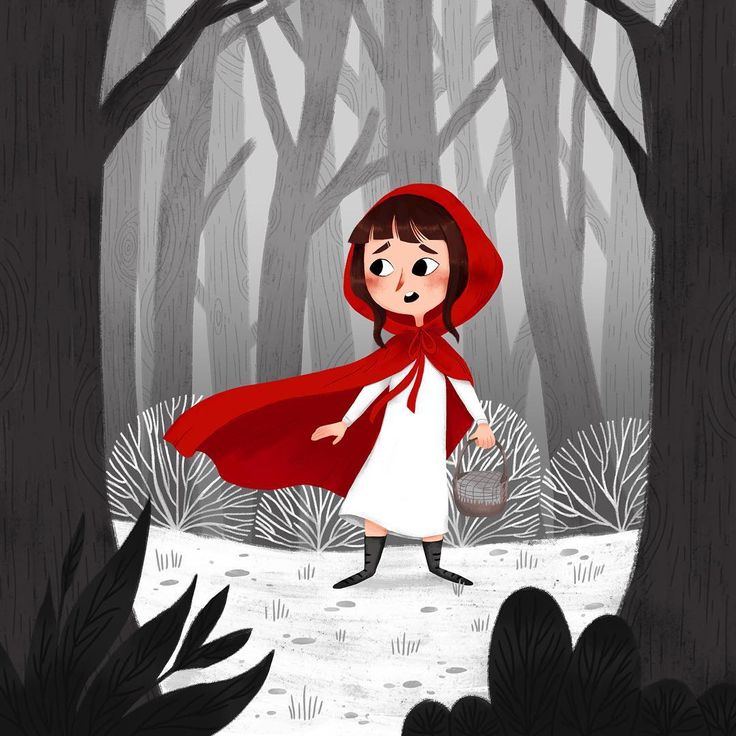 "What is your name?"
"What is your name?"
"My name is friend wolf. And where are you going thus, my pretty one, with your little basket on your arm?"
"I am going to my grandmother, to take her a good piece of cake for her Sunday treat tomorrow."
"And where does she live, your grandmother?"
"She lives at the other side of the wood, in the first house in the village, near the windmill, you know."
"Ah! yes! I know now," said the wolf. "Well, that's just where I'm going; I shall get there before you, no doubt, with your little bits of legs, and I'll tell her you're coming to see her; then she'll wait for you."
Thereupon the wolf cuts across the wood, and in five minutes arrives at the grandmother's house. He knocks at the door: toc, toc.
No answer.
He knocks louder.
Nobody.
Then he stands up on end, puts his two forepaws on the latch and the door opens. Not a soul in the house. The old woman had risen early to sell herbs in the town, and she had gone off in such haste that she had left her bed unmade, with her great nightcap on the pillow.
"Good!" said the wolf to himself, "I know what I'll do."
He shuts the door, pulls on the grandmother's nightcap down to his eyes, then he lies down all his length in the bed and draws the curtains.
In the meantime the good Blanchette went quietly on her way, as little girls do, amusing herself here and there by picking Easter daisies, watching the little birds making their nests, and running after the butterflies which fluttered in the sunshine.
At last she arrives at the door.
Knock, knock.
"Who is there?" says the wolf, softening his rough voice as best he can.
"It's me, Granny, your Little Golden-Hood. I'm bringing you a big piece of cake for your Sunday treat tomorrow."
"Press your finger on the latch, then push and the door opens."
"Why, you've got a cold, Granny," said she, coming in.
"Ahem! a little, a little . . ." replies the wolf, pretending to cough. "Shut the door well, my little lamb.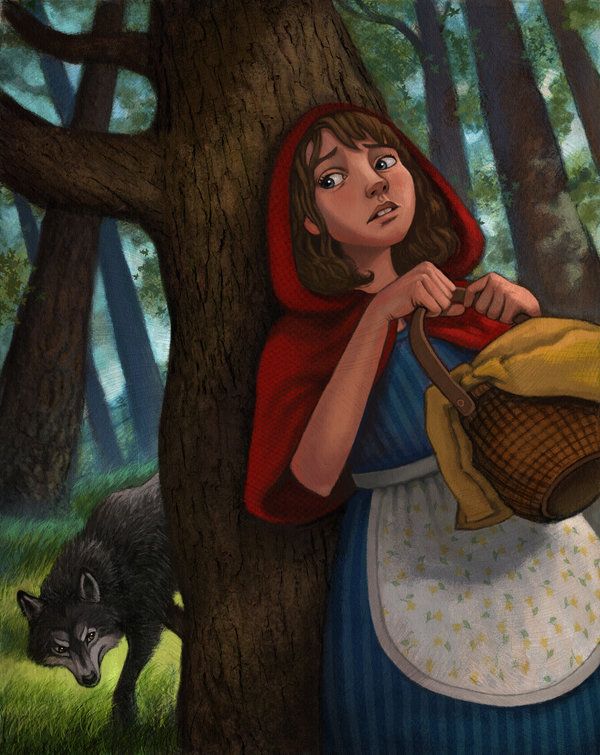 Put your basket on the table, and then take off your frock and come and lie down by me. You shall rest a little."
Put your basket on the table, and then take off your frock and come and lie down by me. You shall rest a little."
The good child undresses, but observe this! She kept her little hood upon her head. When she saw what a figure her Granny cut in bed, the poor little thing was much surprised.
"Oh!" cries she, "how like you are to friend wolf, Grandmother!"
"That's on account of my nightcap, child," replies the wolf.
"Oh! what hairy arms you've got, Grandmother!"
"All the better to hug you, my child."
"Oh! what a big tongue you've got, Grandmother!"
"All the better for answering, child."
"Oh ! what a mouthful of great white teeth you have, Grandmother!"
"That's for crunching little children with!"
And the wolf opened his jaws wide to swallow Blanchette.
But she put down her head crying, "Mamma! Mamma!" and the wolf only caught her little hood.
Thereupon, oh dear! oh dear! he draws back, crying and shaking his jaw as if he had swallowed red-hot coals.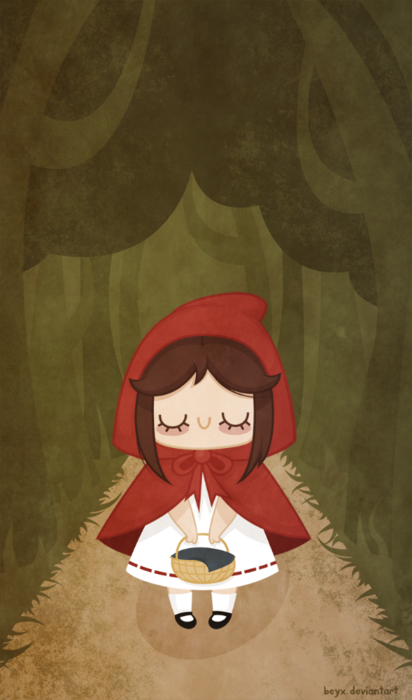 It was the little fire-colored hood that had burnt his tongue right down his throat.
It was the little fire-colored hood that had burnt his tongue right down his throat.
The little hood, you see, was one of those magic caps that they used to have in former times, in the stories, for making oneself invisible or invulnerable. So there was the wolf with his throat burnt, jumping off the bed and trying to find the door, howling and howling as if all the dogs in the country were at his heels.
Just at this moment the grandmother arrives, returning from the town with her long sack empty on her shoulder.
"Ah, brigand!" she cries, "wait a bit!" Quickly she opens her sack wide across the door, and the maddened wolf springs in head downwards.
It is he now that is caught, swallowed like a letter in the post. For the brave old dame shuts her sack, so; and she runs and empties it in the well, where the vagabond, still howling, tumbles in and is drowned.
"Ah, scoundrel! you thought you would crunch my little grandchild! Well, tomorrow we will make her a muff of your skin, and you yourself shall be crunched, for we will give your carcass to the dogs.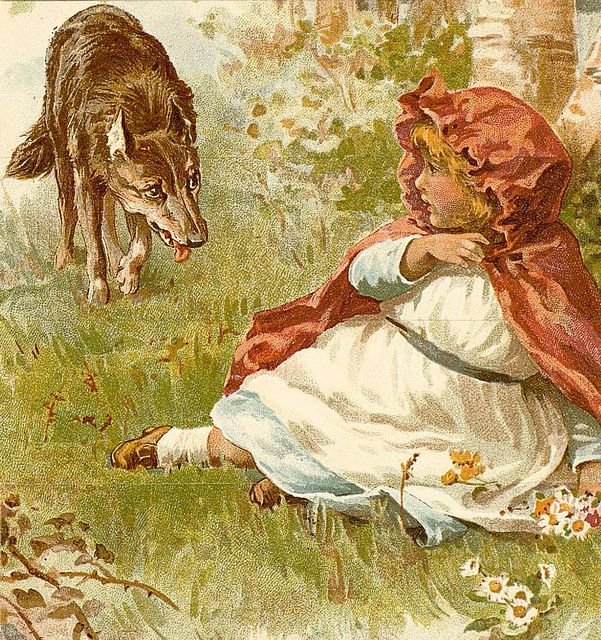 "
"
Thereupon the grandmother hastened to dress poor Blanchette, who was still trembling with fear in the bed.
"Well," she said to her, "without my little hood where would you be now, darling?" And, to restore heart and legs to the child, she made her eat a good piece of her cake, and drink a good draught of wine, after which she took her by the hand and led her back to the house.
And then, who was it who scolded her when she knew all that had happened? It was the mother.
But Blanchette promised over and over again that she would never more stop to listen to a wolf, so that at last the mother forgave her. And Blanchette, the Little Golden-Hood, kept her word. And in fine weather she may still be seen in the fields with her pretty little hood, the color of the sun. But to see her you must rise early.
- Source: Andrew Lang, The Red Fairy Book, 5th edition (London and New York: Longmans, Green, and Company, 1895), pp. 215-19.
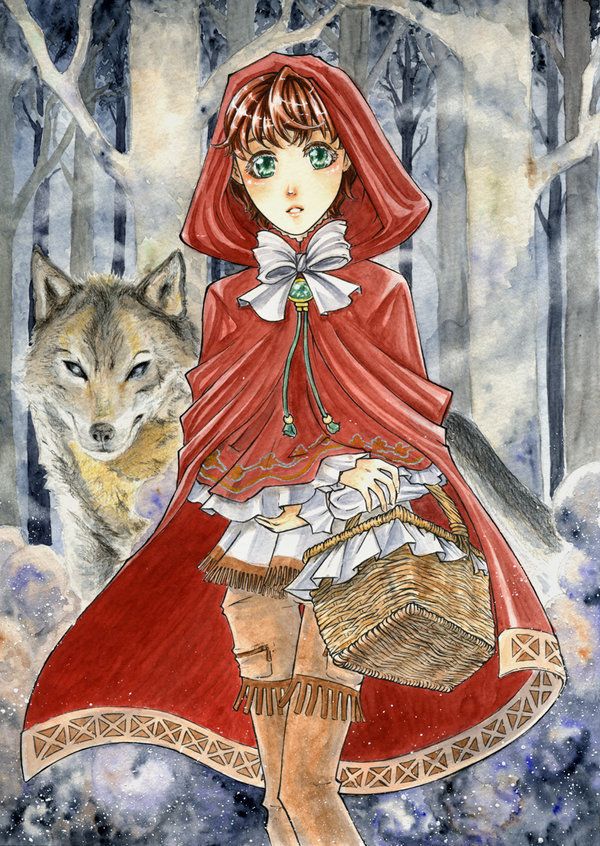
- Lang's source: Charles Marelles.
- Return to the table of contents.
Ireland
Once upon a time there lived a little girl called Red Ridinghood. Her grandmother was sick and her mother sent her with some food to her, and she told her not to speak to anyone on her way. She went along however, and it was not long until she met a wolf. He asked her where she was going, and she said that she was going to see her grandmother who was sick.The wolf said, "All right" and went away. He ran as quickly as he could, and he reached the house before her, and he went into the room and ate the grandmother. He then put on her hat and coat and went into the bed.
When Red Ridinghood arrived she knocked at the door, and the wolf said, "Lift the catch and walk in."
She did so and went into the room. When she saw the wolf inside she thought it was her grandmother, but she thought she had very big eyes and mouth.
"Grandma what great big eyes you have," she said.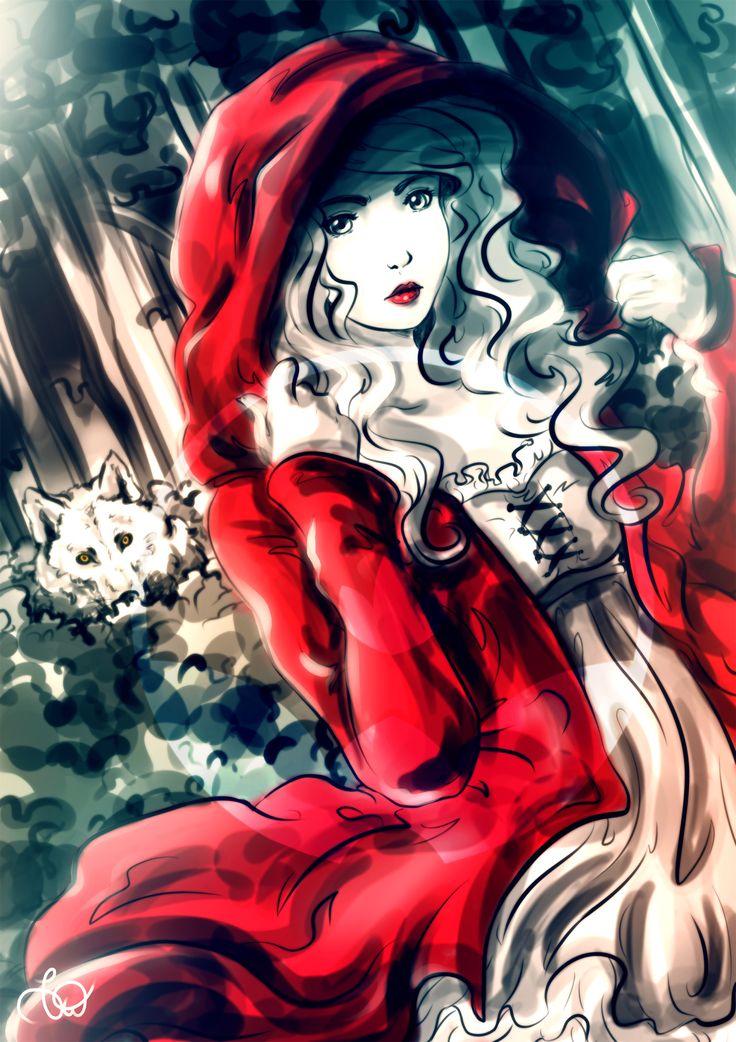
"Just for to see you, my dear," said the wolf.
"Grandma, what great ears you have."
"Just for to hear my dear."
"Grandma what great big mouth you have."
"Just for to eat you my dear," and he jumped out of the bed and ate her.
I got this story from
Thomas Burke,
Cluide,
Corrandulla,
Co. Galway.
Aged 43 years.Annie O'Dowde
Cluide,
Corrandulla,
Co. Galway.
- Source: dúchas.ie >> The Schools' Collection >> Co. Galway >> Caisleán hAicéid, pp. 129-30.
- The material on this site is made available under the CC BY-NC 4.0 licence.
- The Schools' Collection is a manuscript collection of folklore compiled by schoolchildren in Ireland in the 1930s.
- Return to the table of contents.
Ireland
One day a little girl was going to see her grandmother. She brought butter and eggs in a basket to her grandmother.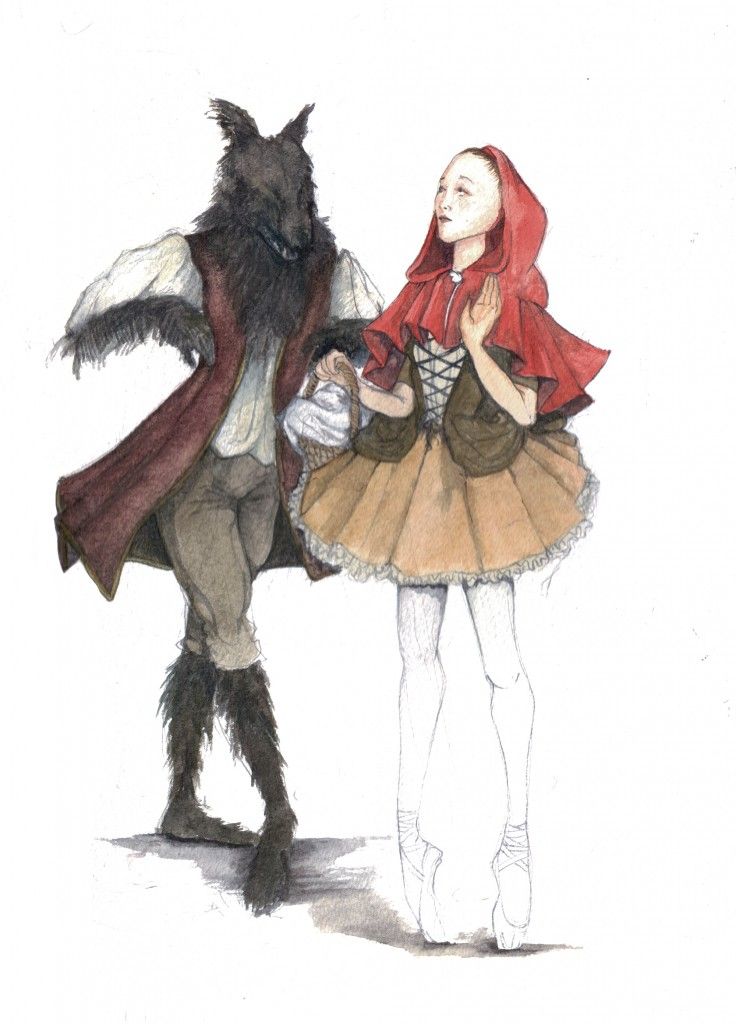 Her mother told her to go the pathway, but she did not go the pathway, but she went through a wood, and while she was going a wolf saw her, and he knew where she was going, and he went off before her. When he came to the grandmothers he went in and he devoured her grandmother.
Her mother told her to go the pathway, but she did not go the pathway, but she went through a wood, and while she was going a wolf saw her, and he knew where she was going, and he went off before her. When he came to the grandmothers he went in and he devoured her grandmother. When the little girl came to her grandmother's house she went into the kitchen. There was nobody there before her. Then she went into the room, and the wolf was inside in bed before her.
She thought it was her grandmother, and she began talking to the wolf and she said to the wolf, "Isn't it great big ears you've got," and after a awhile she spoke again. She said, "Isn't it great big hands you've got." And then she said to the wolf again, "Isn't it a great big mouth you'e got," and then the wolf sprang, and he was going to eat the little girl, and the little girl began roaring, and there were men cutting wood in the wood, and they heard the roaring, and one of them ran to the house and cut off the wolf's head.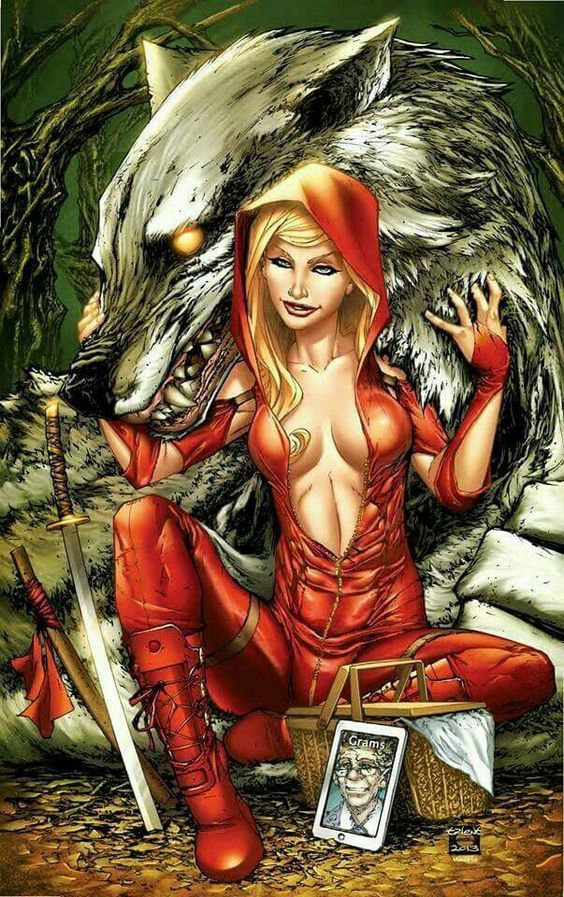
The little girl escaped.
| Mary O'Brien | Told by John Eustace |
| Erribul, | Erribul, |
| Shanahea PO. | Shanahea PO. |
- Source: dúchas.ie >> The Schools' Collection >> Co. Clare >> Effernan, Cill an Dísirt, pp. 171-72.
- The material on this site is made available under the CC BY-NC 4.0 licence.
- The Schools' Collection is a manuscript collection of folklore compiled by schoolchildren in Ireland in the 1930s.
- Return to the table of contents.
Ireland
One time there lived a little girl. Her name was Red Riding Hood. She was dressed in a coat of red, and she wore a hood on her head. That was why she was called Red Riding Hood. She lived beside a wood. This little girl had a granny who lived the far side of the wood.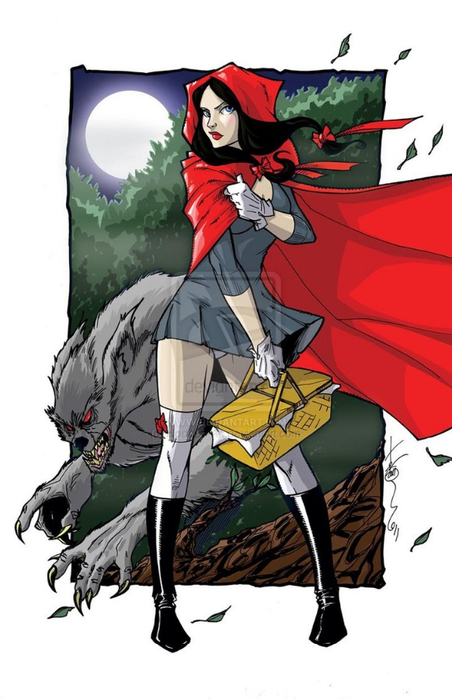 One day she was ill, and Red Riding Hood's mother sent her with a basket of goods to her granny.
One day she was ill, and Red Riding Hood's mother sent her with a basket of goods to her granny. When she was going through the wood she met a wolf. The wolf asked her where she was going. She told him she was going to her granny who was ll. When the wolf heard the news he ran on before her and got into her granny's cottage and killed her. Then he got into the bed and put the granny's glasses on his eyes. Then he got her nightgown and put it on. Next he got her night cap and put it on his head. Then he got into the bed and covered himself up.
After a while he heard a knock at the door. The wolf told the little girl to come in. When the little girl came in she wondered how strange looking her granny was. Before she had said the words the wolf leaped out of the bed. Then the little girl began to scream. Her father was cutting timber in the wood. When he heard the noise he ran in and killed the wolf.
When he had the wolf killed the little girl's granny jumped out of the wolf's stomach again.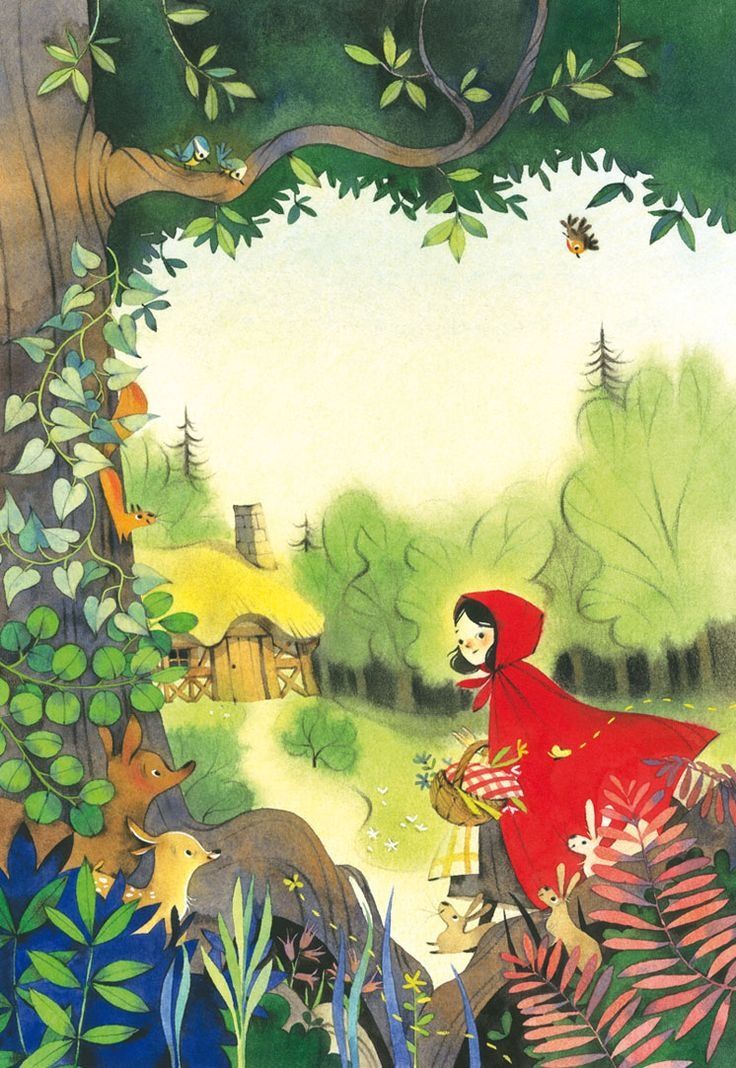
Michaél O Loinseach, Crannagh, Co. Laois.
- Source: dúchas.ie >> The Schools' Collection >> Co. Laois >> Ballyadams, pp. 141-42 .
- The material on this site is made available under the CC BY-NC 4.0 licence.
- The Schools' Collection is a manuscript collection of folklore compiled by schoolchildren in Ireland in the 1930s.
- Return to the table of contents.
Romania
In a small hut far up in the mountains there lived an old man with four small children. They were his grandchildren. He loved them very much and took good care of them.Whenever he went into the village to buy food he would say to his grandchildren, "Dear little children! If anyone comes to the door do not let them inside. Some day the wolf might come by, and he would eat you up!"
Once he went into the village, and the wolf did come to the door and called out, "Dear children, open the door for me!"
The children thought about their grandfather's warning not to open the door, and they said nothing.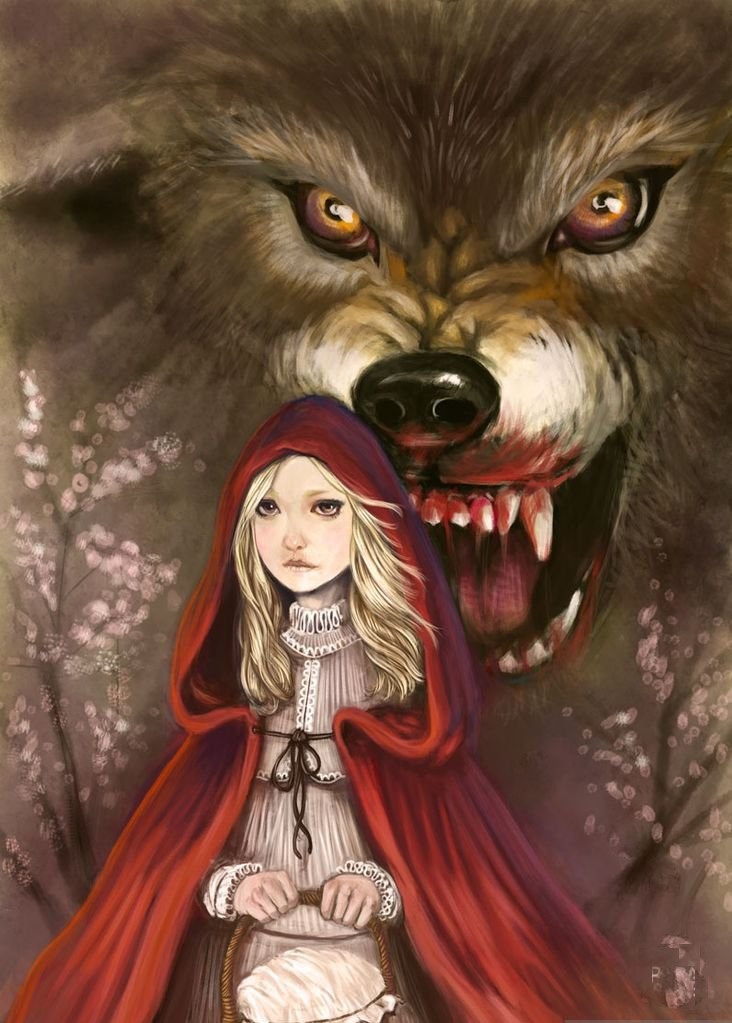
Then the wolf said, "Open up! Your grandfather sent me!"
Then the oldest child said, "Why did grandfather send you?"
The wolf answered, "He sent a sweet cake for you!"
The children could no longer resist. They opened the door. The wolf sprang inside and ate up all four of the children. He looked around in the room to see if he might find something else to eat. He found a large bottle filled with brandy. He put the bottle to his mouth and drank it empty. He became so drunk that he could not move from the spot and had to lie down in the hut.
Toward evening the grandfather returned home and saw the snoring wolf lying on the floor in the middle of the room. At once he knew what had happened to his grandchildren. He took a sharp knife and slit open the wolf's belly. The children jumped out, and the grandfather hid them.
Then the grandfather took some dry lime, filled the wolf's belly with it, and then sewed the opening shut. When the wolf woke up he was thirsty and ran to the brook, where he drank a lot of water.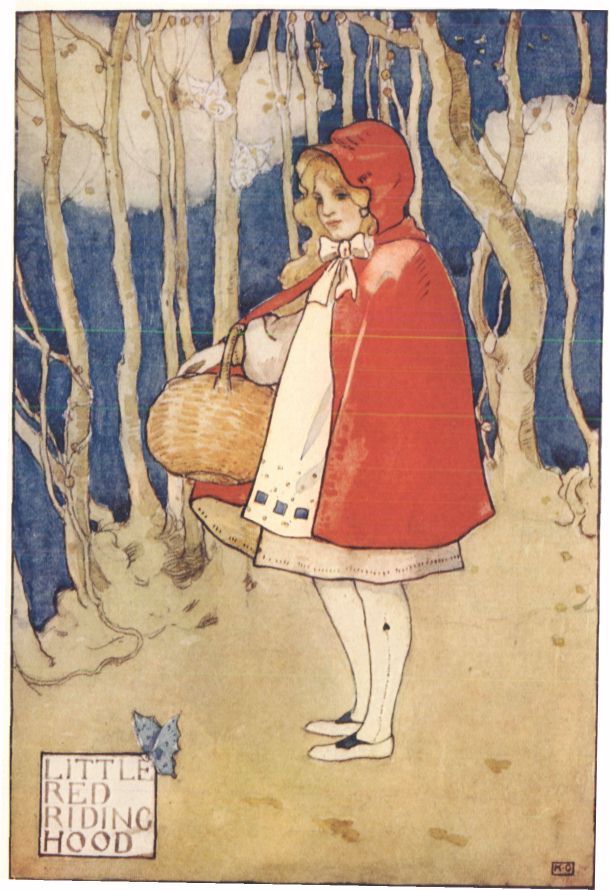 The lime in his belly began to boil and to burn. The wolf burst apart and died a miserable death.
The lime in his belly began to boil and to burn. The wolf burst apart and died a miserable death.
- Source (books.google.com): Heinrich von Wlislocki, "Der alte Mann und der Wolf," Märchen und Sagen der transsilvanischen Zigeuner (Berlin: Nicolaische Verlags-Buchhandlung, 1886), no. 58, pp. 130-31.
- Source (Internet Archive): Heinrich von Wlislocki, "Der alte Mann und der Wolf," Märchen und Sagen der transsilvanischen Zigeuner (Berlin: Nicolaische Verlags-Buchhandlung, 1886), no. 58, pp. 130-31.
- Return to the table of contents.
Beatrix Potter
What a funny sight it is to see a brood of ducklings with a hen!-- Listen to the story of Jemima Puddle-duck, who was annoyed because the farmer's wife would not let her hatch her own eggs.
Her sister-in-law, Mrs. Rebeccah Puddle-duck, was perfectly willing to leave the hatching to some one else -- "I have not the patience to sit on a nest for twenty-eight days; and no more have you, Jemima.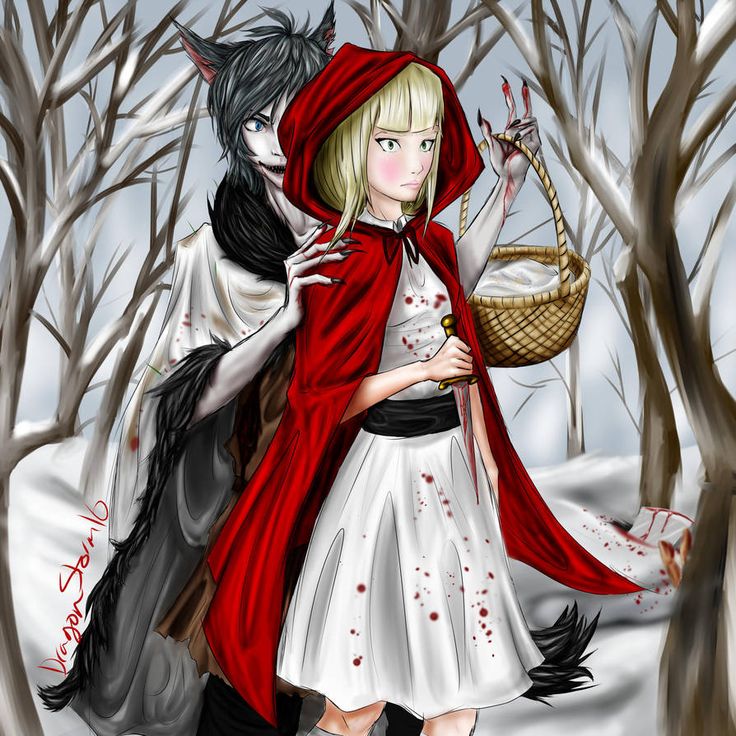 You would let them go cold; you know you would!"
You would let them go cold; you know you would!"
"I wish to hatch my own eggs; I will hatch them all by myself," quacked Jemima Puddle-duck.
She tried to hide her eggs; but they were always found and carried off.
Jemima Puddle-duck became quite desperate. She determined to make a nest right away from the farm.
She set off on a fine spring afternoon along the cart-road that leads over the hill.
She was wearing a shawl and a poke bonnet.
When she reached the top of the hill, she saw a wood in the distance.
She thought that it looked a safe quiet spot.
Jemima Puddle-duck was not much in the habit of flying. She ran downhill a few yards flapping her shawl, and then she jumped off into the air.
She flew beautifully when she had got a good start.
She skimmed along over the tree-tops until she saw an open place in the middle of the wood, where the trees and brushwood had been cleared.
Jemima alighted rather heavily, and began to waddle about in search of a convenient dry nesting-place.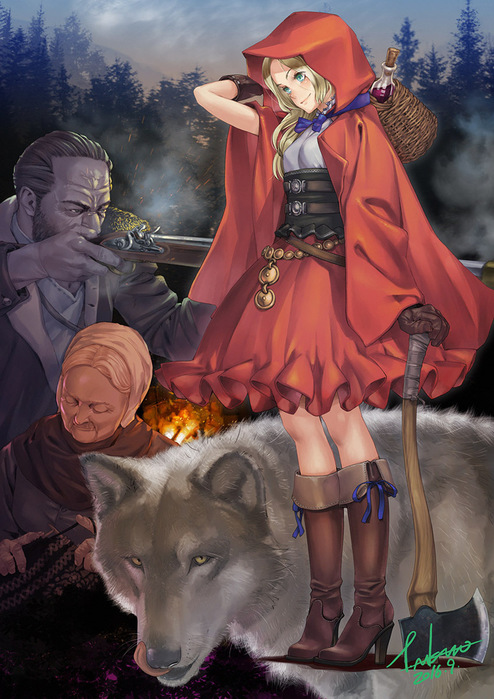 She rather fancied a tree-stump amongst some tall fox-gloves.
She rather fancied a tree-stump amongst some tall fox-gloves.
But -- seated upon the stump, she was startled to find an elegantly dressed gentleman reading a newspaper.
He had black prick ears and sandy coloured whiskers.
"Quack?" said Jemima Puddle-duck, with her head and her bonnet on one side -- "Quack?"
The gentleman raised his eyes above his newspaper and looked curiously at Jemima --
"Madam, have you lost your way?" said he. He had a long bushy tail which he was sitting upon, as the stump was somewhat damp.
Jemima thought him mighty civil and handsome. She explained that she had not lost her way, but that she was trying to find a convenient dry nesting-place.
"Ah! is that so? indeed!" said the gentleman with sandy whiskers, looking curiously at Jemima. He folded up the newspaper, and put it in his coat-tail pocket.
Jemima complained of the superfluous hen.
"Indeed! how interesting! I wish I could meet with that fowl.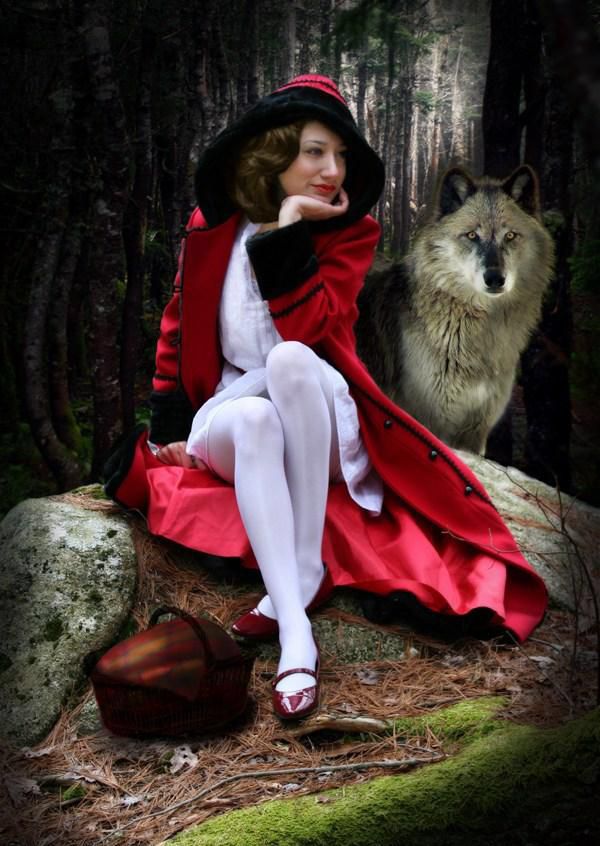 I would teach it to mind its own business!"
I would teach it to mind its own business!"
"But as to a nest -- there is no difficulty: I have a sackful of feathers in my wood-shed. No, my dear madam, you will be in nobody's way. You may sit there as long as you like," said the bushy long-tailed gentleman.
He led the way to a very retired, dismal-looking house amongst the fox-gloves.
It was built of faggots and turf, and there were two broken pails, one on top of another, by way of a chimney.
"This is my summer residence; you would not find my earth -- my winter house -- so convenient," said the hospitable gentleman.
There was a tumble-down shed at the back of the house, made of old soap-boxes. The gentleman opened the door, and showed Jemima in.
The shed was almost quite full of feathers -- it was almost suffocating; but it was comfortable and very soft.
Jemima Puddle-duck was rather surprised to find such a vast quantity of feathers. But it was very comfortable; and she made a nest without any trouble at all.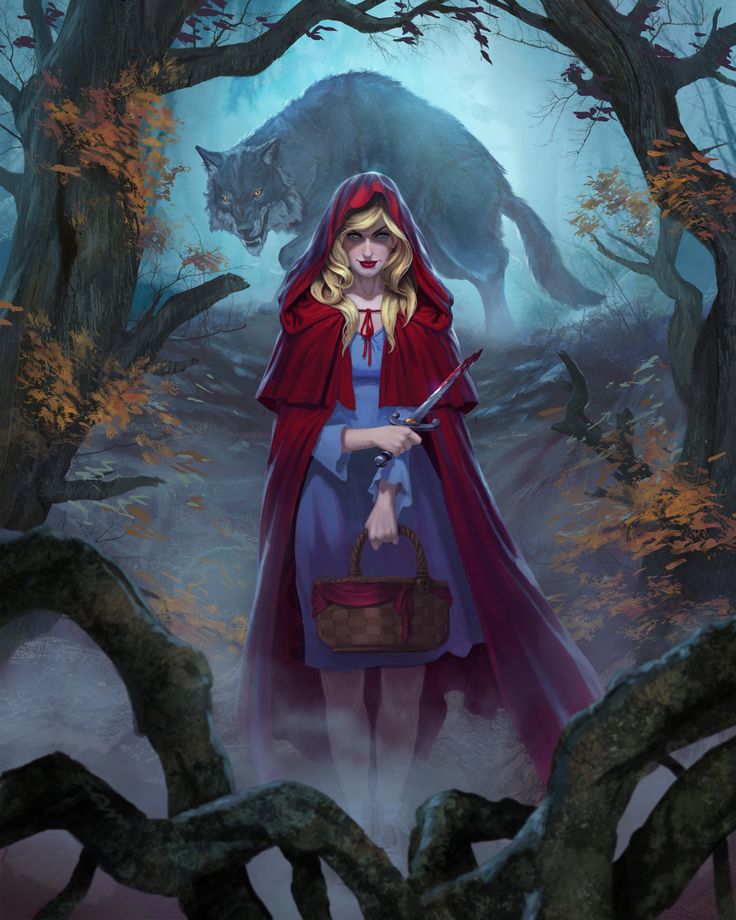
When she came out, the sandy whiskered gentleman was sitting on a log reading the newspaper -- at least he had it spread out, but he was looking over the top of it.
He was so polite, that he seemed almost sorry to let Jemima go home for the night. He promised to take great care of her nest until she came back again next day.
He said he loved eggs and ducklings; he should be proud to see a fine nestful in his wood-shed.
Jemima Puddle-duck came every afternoon; she laid nine eggs in the nest. They were greeny white and very large. The foxy gentleman admired them immensely. He used to turn them over and count them when Jemima was not there.
At last Jemima told him that she intended to begin to sit next day -- "and I will bring a bag of corn with me, so that I need never leave my nest until the eggs are hatched. They might catch cold," said the conscientious Jemima.
"Madam, I beg you not to trouble yourself with a bag; I will provide oats. But before you commence your tedious sitting, I intend to give you a treat.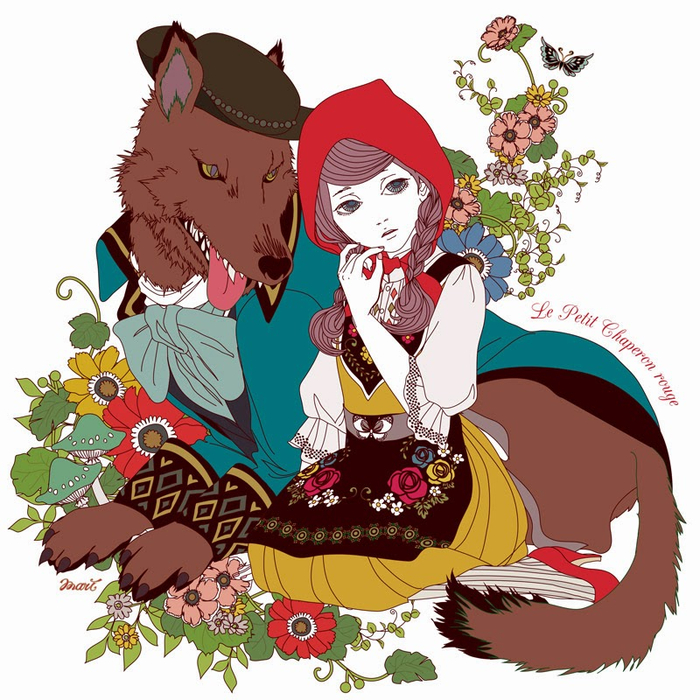 Let us have a dinner-party all to ourselves!
Let us have a dinner-party all to ourselves!
"May I ask you to bring up some herbs from the farm-garden to make a savoury omelette? Sage and thyme, and mint and two onions, and some parsley. I will provide lard for the stuff-lard for the omelette," said the hospitable gentleman with sandy whiskers.
Jemima Puddle-duck was a simpleton: not even the mention of sage and onions made her suspicious.
She went round the farm-garden, nibbling off snippets of all the different sorts of herbs that are used for stuffing roast duck.
And she waddled into the kitchen, and got two onions out of a basket.
The collie-dog Kep met her coming out, "What are you doing with those onions? Where do you go every afternoon by yourself, Jemima Puddle-duck?"
Jemima was rather in awe of the collie; she told him the whole story.
The collie listened, with his wise head on one side; he grinned when she described the polite gentleman with sandy whiskers.
He asked several questions about the wood, and about the exact position of the house and shed.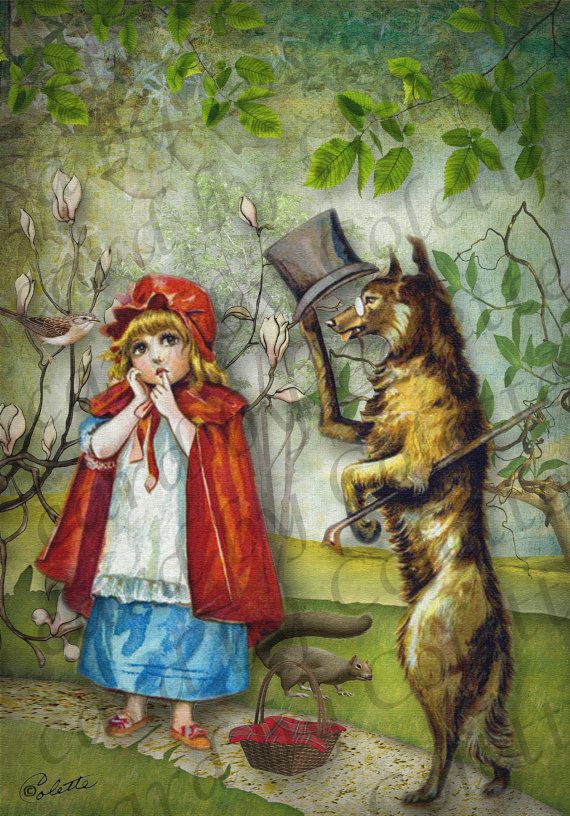
Then he went out, and trotted down the village. He went to look for two fox-hound puppies who were out at walk with the butcher.
Jemima Puddle-duck went up the cart-road for the last time, on a sunny afternoon. She was rather burdened with bunches of herbs and two onions in a bag.
She flew over the wood, and alighted opposite the house of the bushy long-tailed gentleman.
He was sitting on a log; he sniffed the air, and kept glancing uneasily round the wood. When Jemima alighted he quite jumped.
"Come into the house as soon as you have looked at your eggs. Give me the herbs for the omelette. Be sharp!"
He was rather abrupt. Jemima Puddle-duck had never heard him speak like that.
She felt surprised, and uncomfortable.
While she was inside she heard pattering feet round the back of the shed. Some one with a black nose sniffed at the bottom of the door, and then locked it.
Jemima became much alarmed.
A moment afterwards there were most awful noises -- barking, baying, growls and howls, squealing and groans.
And nothing more was ever seen of that foxy-whiskered gentleman.
Presently Kep opened the door of the shed, and let out Jemima Puddle-duck.
Unfortunately the puppies rushed in and gobbled up all the eggs before he could stop them.
He had a bite on his ear and both the puppies were limping.
Jemima Puddle-duck was escorted home in tears on account of those eggs.
She laid some more in June, and she was permitted to keep them herself: but only four of them hatched.
Jemima Puddle-duck said that it was because of her nerves; but she had always been a bad sitter.
- Source: Beatrix Potter, The Tale of Jemima Puddle-Duck (New York: Frederick Warne and Company, 1908).
- Return to the table of contents.
Additional texts
Some items listed below are in copyright and available only in print form.- Bates, Clara Doty. Little Red Riding-Hood. Versified by Mrs. Clara Doty Bates, illustrated by Mrs.
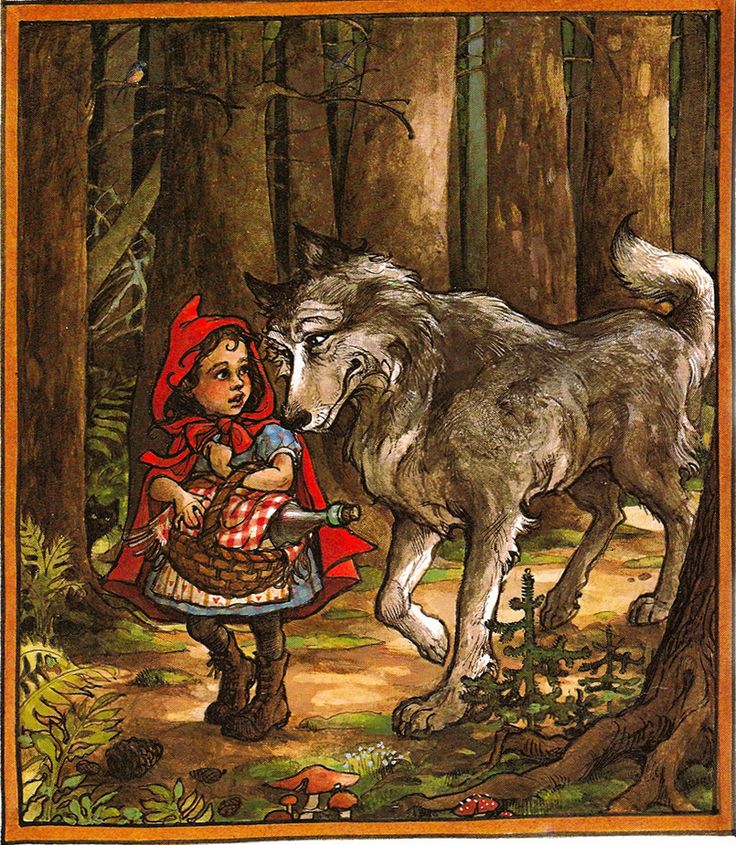 C. D. Finley (Boston: D. Lothrop and Company, 1883).
C. D. Finley (Boston: D. Lothrop and Company, 1883). - Barker, James N. "Little Red Riding Hood," Specimens of American Poetry with Critical and Biographical Notices, edited by Samuel Kettell, vol. 2 (Boston: S. G. Goodrich and Company, 1829), pp. 338-41.
- Calvino, Italo. "The Wolf and the Three Girls," Italian Folktales (New York: Houghton Mifflin Harcourt, 1992), no. 26, pp. 75-76.
- Carryl, Guy Wetmore. "The New Red Riding Hood," Public Opinion: A Comprehensive Summary of the Press throughout the World on All Important Current Topics, vol. 30 (January - June 1901), pp. 542-44. First published in the Saturday Evening Post.
- Carryl, Guy Wetmore. "How Little Red Riding Hood Came to Be Eaten," Grimm Tales Made Gay (Boston and New York: Houghton, Mifflin, and Company, 1902), pp. 21-28.
- Cattarinetta, a folktale from Italy of type 333A about a careless girl who is eaten up by a witch.
- Croser, Nigel. Little Red Riding Hood.
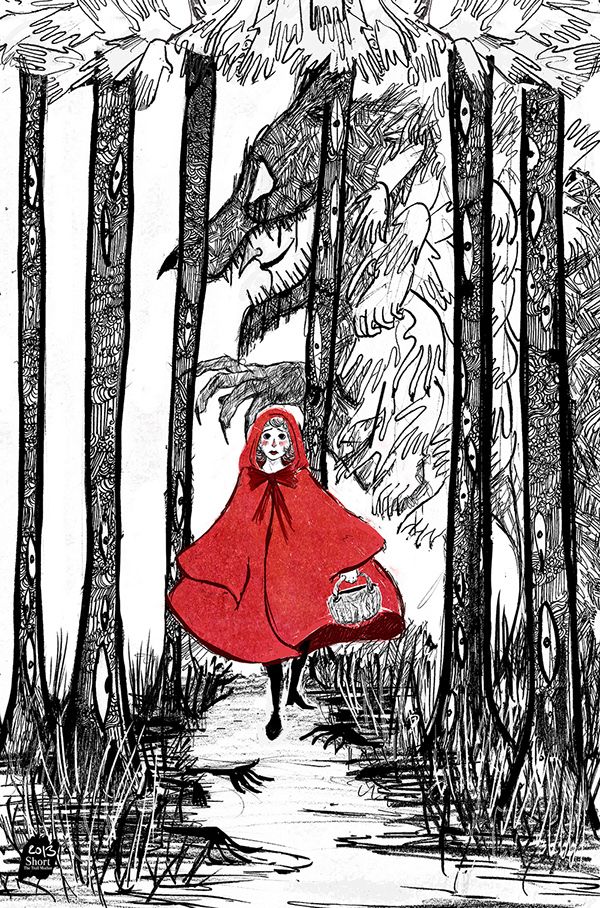 Words by Nigel Croser, illustrated by Leanne Argent (Flinders Park, SA, Australia: Era Publications, 2003).
Words by Nigel Croser, illustrated by Leanne Argent (Flinders Park, SA, Australia: Era Publications, 2003). - Dahl, Roald, "Little Red Riding Hood and the Wolf," Fiction and Poetry Texts, year 5, edited by Julie Orrell and Eileen Jones (Cheltenham, U.K.: Nelson Thomes, 2004), p. 23.
- Dundes, Alan, ed. Little Red Riding Hood: A Casebook, (Madison: University of Wisconsin Press, 1989).
- Grimm, Jacob and Wilhelm. The Grimm Brothers' Little Red Cap, version of 1857. This version is only slightly different from the version of 1812, translated above.
- Mieder, Wolfgang, "Little Red Riding Hood," Disenchantments: An Anthology of Modern Fairy Tale Poetry (Hanover [New Hampshire] and London: University Press of New England, 1985), ch. 7, pp. 95-114.
- The Rescue of Little Red Riding Hood: A Juvenile Operetta in Five Acts (Nashville: C. R. and H. H. Hatch, 1883).
- Riley, James Whitcomb. "Maymie's Story of Red Riding-Hood," The Complete Works of James Whitcomb Riley, collected and edited by Edmund Henry Eitel, vol.
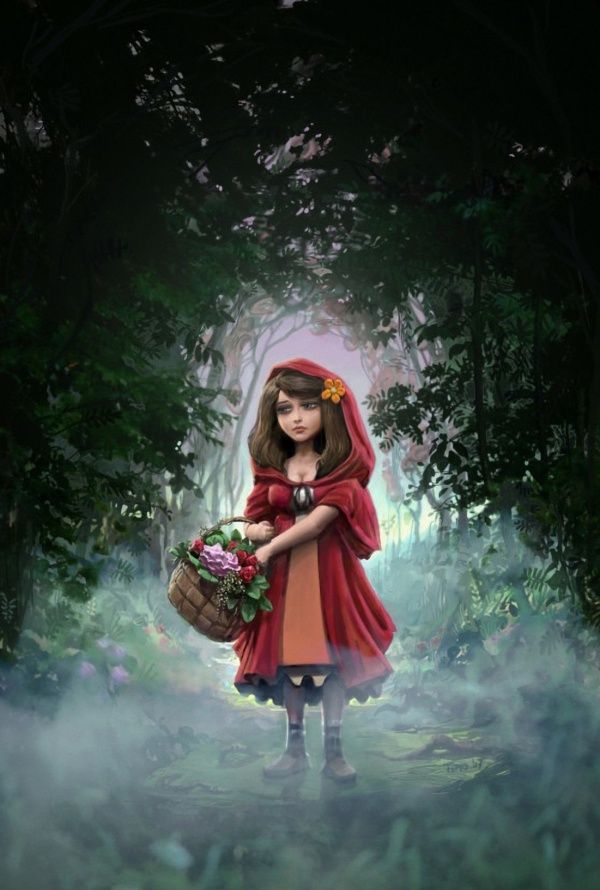 4 (© 1913), pp. 412-18.
4 (© 1913), pp. 412-18. - Ritz, Hans, Die Geschichte vom Rotkäppchen: Ursprünge, Analysen, Parodien eines Märchens (Emstal: Muriverlag, 1981),
- Thackeray, Miss [Anne Thackeray Ritchie]. Little Red Riding Hood (Boston: Loring, 1867).
- Thurber, James. "The Little Girl and the Wolf," Fables for Our Time and Famous Poems Illustrated (New York: Harper Collins, 1983), p. 3.
- Tieck, Ludwig. Leben und Tod des kleinen Rothkäppchens (1800). This is a large pdf file (8.54 megabytes) containing facsimiles of three dramas from Ludwig Tieck's Schriften, vol. 2 (Berlin: G. Reimer, 1828). His version of "Little Red Riding Hood" is found on pages 327-62.
- "The Wolf-King; or, Little Red-Riding-Hood: An Old Woman's Tale," Tales of Terror, 2nd edition (London, 1808), no. 4, pp. 22-28.
- Zipes, Jack. The Trials and Tribulations of Little Red Riding Hood: Versions of the Tale in Sociocultural Context, (South Hadley, Massachusetts: Bergin and Garvey Publishers, 1983).
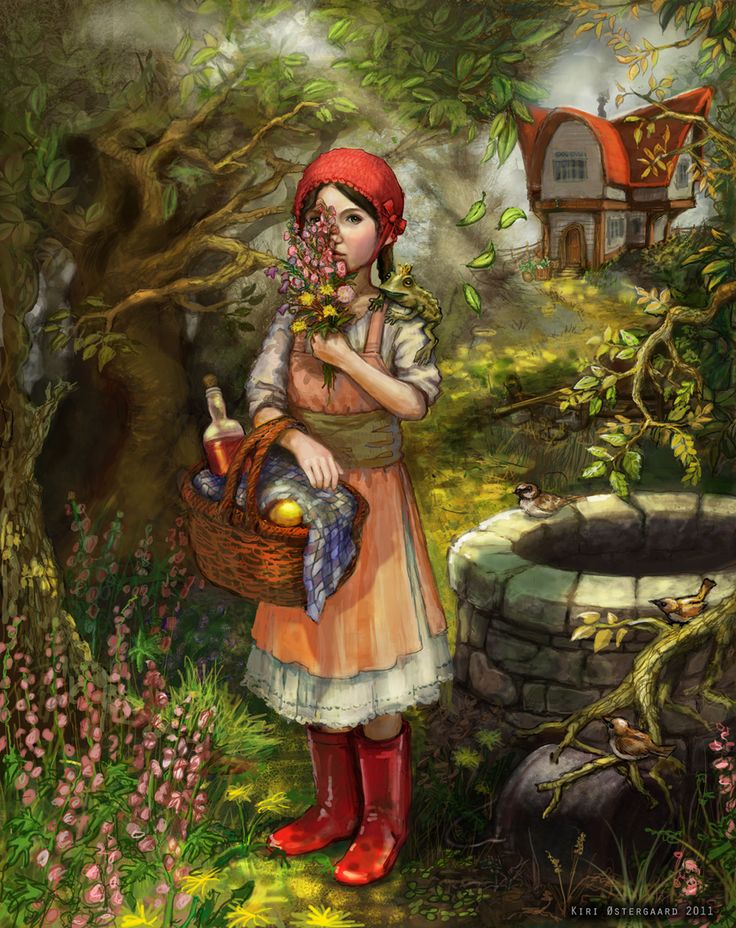
Essays and Internet sites
- The Annotated Little Red Riding Hood from the SurLaLune Fairy Tale Pages by Heidi Anne Heiner.
- Little Red Riding Hood from Wikipedia.
- Le Petit Chaperon rouge, an article from the French-language Wikipedia.
- Rotkäppchen, an article from the German-language Wikipedia.
- Charles Perrault's Mother Goose Tales.
- Grimm Brothers' Home Page.
Return to
- The table of contents.
- D. L. Ashliman's folktexts, a library of folktales, folklore, fairy tales, and mythology.
Revised April 25, 2021.
Read the fairy tale Little Red Riding Hood online
The fairy tale of Charles Perrault Little Red Riding Hood is one of the undoubted leaders of fairy tale characters all over the world. The story that happened to the girl is short, but it teaches a lot. The love for Grandmother, fearlessness, kindness of the Riding Hood is put at the ready of the evil of the wolf, who lives alone in the dark forest.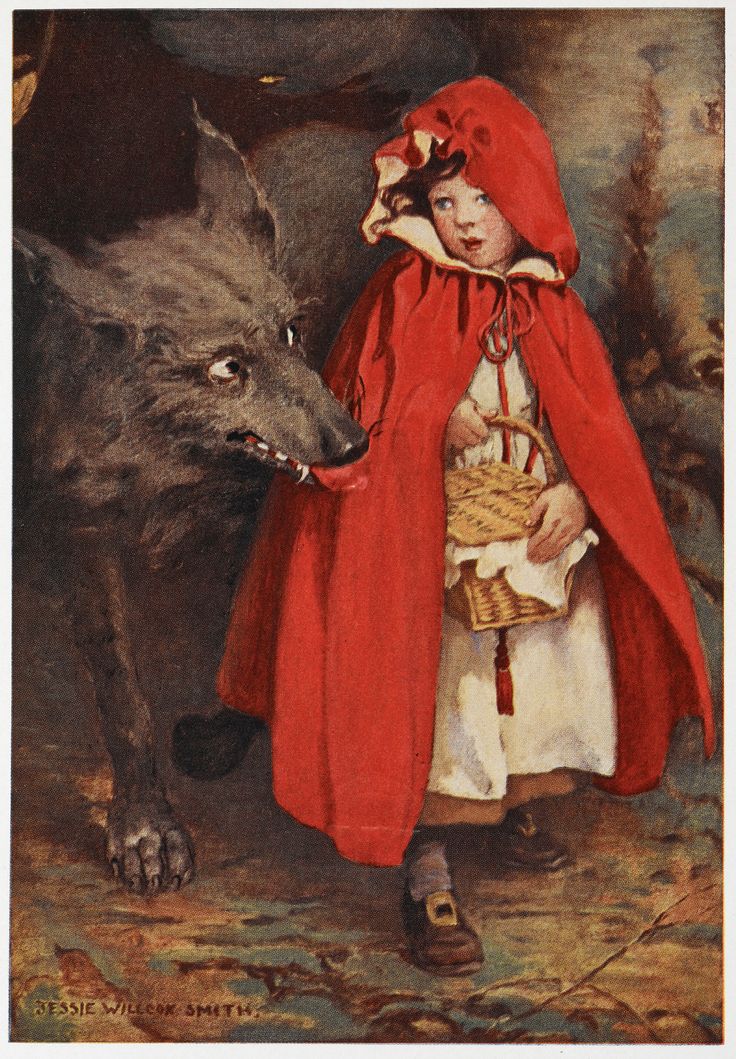 The fairy tale is perfect for reading at night, many parents choose this fairy tale as the first fairy tale for their child.
The fairy tale is perfect for reading at night, many parents choose this fairy tale as the first fairy tale for their child.
Once upon a time in a village there was a girl of unprecedented beauty: her mother loved her without memory, and her grandmother even more.
Once a grandmother sewed a red hat for her beloved granddaughter, and the girl liked it so much that she did not want to take it off. She went everywhere in her cap, and therefore they began to call her Little Red Riding Hood.
Once a mother has baked pies and says to her daughter:
— Go and visit your grandmother, she is not well. Yes, take her pies and a pot of butter. Look only in the forest, do not stop and do not talk to anyone.
Little Red Riding Hood was an obedient girl, she immediately packed up and went to her grandmother, who lived in another village.
She is walking along a forest path when a wolf meets her. The wolf wanted to eat it, but was afraid, because the sound of woodcutters was heard nearby.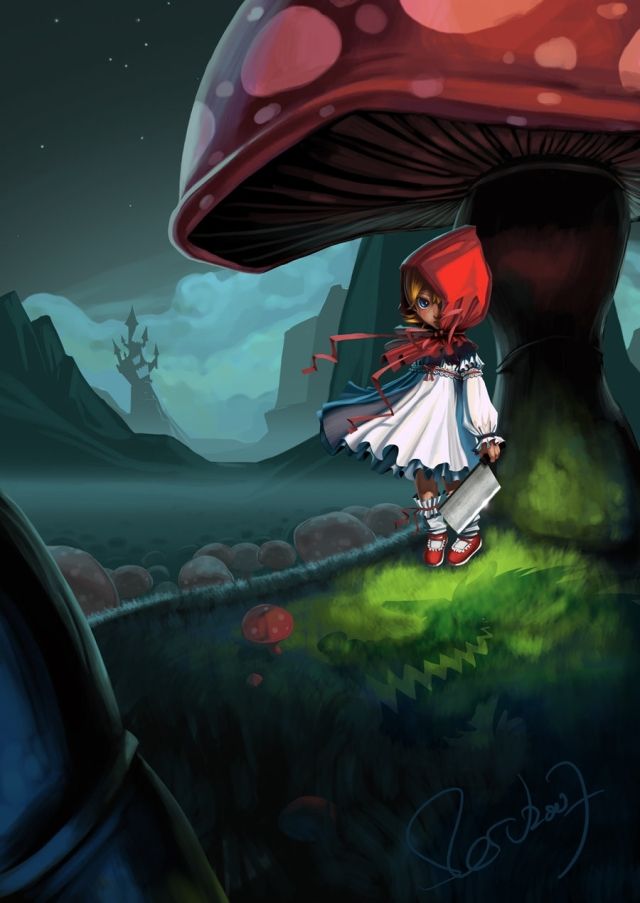 So he asks:
So he asks:
— Where are you going, Little Red Riding Hood?
The poor girl forgot that it is dangerous to stop in the forest and talk to wolves, and answers him:
— I am going to my grandmother; I bring her pies and a pot of butter.
— Does your grandmother live far away? the wolf asks.
- Very far away! - answers Little Red Riding Hood: - over there behind that mill that can be seen at the edge of the forest; and there will be the first house as you enter the village.
“You know,” the wolf says to her, “I’ll go and visit your grandmother.” - I will go this way, and you go on that one: let's see which of us will reach faster.
And the wolf rushed with all his might to run along the shortest road, and the girl wandered slowly along the longest. Along the way, she collected bouquets and sang songs.
The wolf ran first to the grandmother's house. Knocked:
- Knock, knock.
Who is there?
- It's me, your granddaughter, Little Red Riding Hood, - answered the wolf in a thin voice: - I brought you pies and a pot of butter.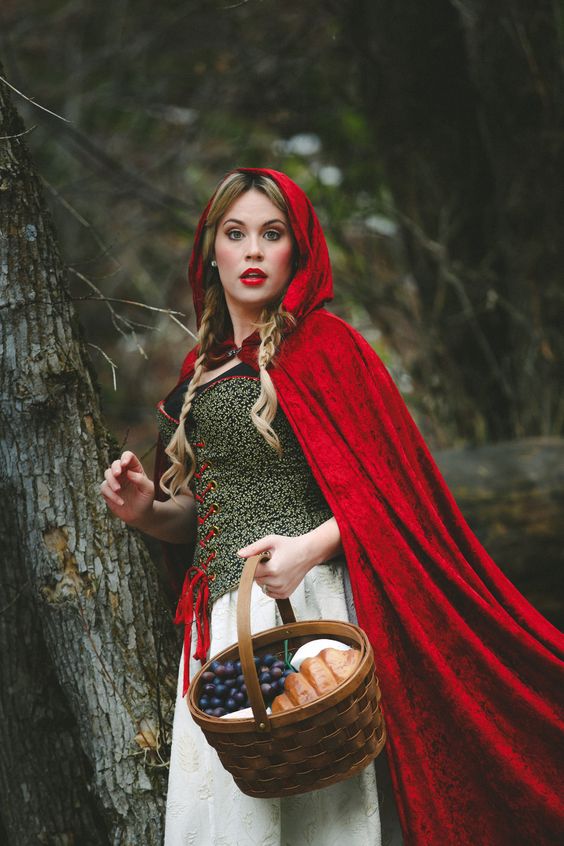
Grandmother was lying in bed because she was a little unwell, and shouted from there:
— Pull the rope, the door will open by itself.
The wolf pulled the rope, the door opened. He rushed at the old woman and swallowed her at once, because he had not eaten anything for more than three days.
Then he locked the door, lay down in his grandmother's bed and began to wait for Little Red Riding Hood, who after a while reached her grandmother's house and knocked:
— Knock, knock.
- Who's there?
Hearing the rough voice, Little Red Riding Hood was frightened at first, but thinking that apparently her grandmother's voice was hoarse due to illness, she answered:
— It's me, your granddaughter, Little Red Riding Hood, who brought you pies and a pot of butter.
The wolf shouted as soon as he could in a thin voice:
— Pull the rope, the door will open by itself.
Little Red Riding Hood pulled the string, the door opened.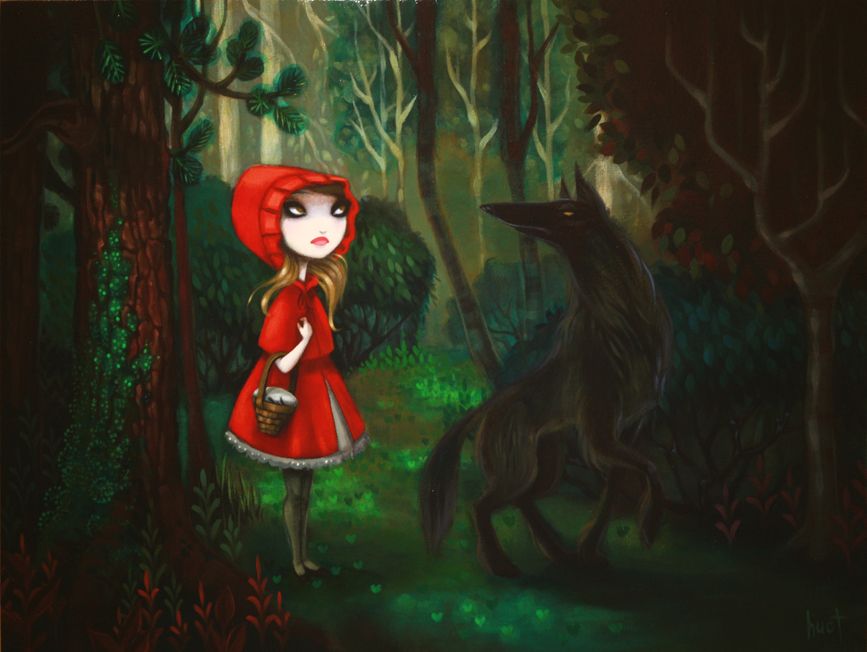 When the girl entered, the wolf wrapped himself well in a blanket so that she would not recognize him, and said:0003
When the girl entered, the wolf wrapped himself well in a blanket so that she would not recognize him, and said:0003
— Put somewhere a pie and a pot of butter, and go lie down with me, rest after the journey.
Little Red Riding Hood lay down next to her and asked:
— Grandmother, grandmother, why do you have such big hands?
— This, granddaughter, to hug you tighter.
— Grandmother, grandmother, why do you have such big ears?
— This, granddaughter, to hear you better.
— Grandmother, grandmother, why do you have such big eyes?
— This, granddaughter, to see you better.
— Grandmother, grandmother, why do you have such big teeth?
— And this is to eat you!
And with these words, the evil wolf rushed at Little Red Riding Hood and swallowed her. It is good that at that time woodcutters worked in the forest. They heard a noise and ran into the house, where they immediately rushed to the wolf. They freed Little Red Riding Hood and Grandmother. Both were whole and unharmed.
Both were whole and unharmed.
Little Red Riding Hood is one of the most popular fairy tales and not only among the fairy tales of Charles Perrault, but also among the fairy tales of all authors all over the world.
This fairy tale is one of the first stories read to children. A simple and seemingly uncomplicated story of a girl in a red cap, in fact, is a fairy tale with a deep meaning and psychological overtones.
Little Red Riding Hood is a story with a moral and clear conclusions:
- You can’t do what your mother doesn’t tell you
- You can’t talk to strangers
- You can’t go astray
- You can’t be too trusting
However, Little Red Riding Hood does bad things. At the first meeting with danger, with a wolf, she forgets all the instructions of her mother and begins to talk with the beast. That is why the girl was eaten at the end of the tale. The sad ending turns into a kind and happy ending with the arrival of the hunters, who kill the wolf and free Red and her grandmother.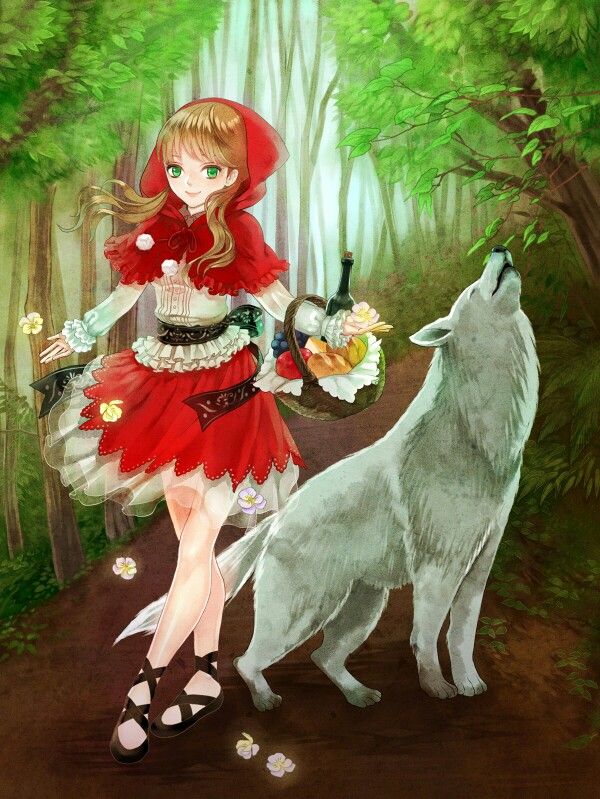
Do not try to interpret this tale more seriously and look for hidden subtext in it - it will be wrong. The story has a very clear and subtle meaning.
Fairy tale "Little Red Riding Hood" (Ch. Perro). Read and listen
At New Year's performances, matinees and holidays, you can often meet such a character as Little Red Riding Hood. It is easy to recognize her - she is with gifts (cakes or pies, as well as a pot of butter), which are in her knapsack or basket; and most importantly, that on her head is wearing a red cap, sewn by her mother's hands. And Little Red Riding Hood came to us from a fairy tale, which is presented to your attention.
Listen to a fairy tale (5min52sec)
Fairy tale "Little Red Riding Hood"
Author: Charles Perrault
Once upon a time in a village there was a little girl, so pretty that she was the best in the world. Her mother loved her without memory, and her grandmother even more.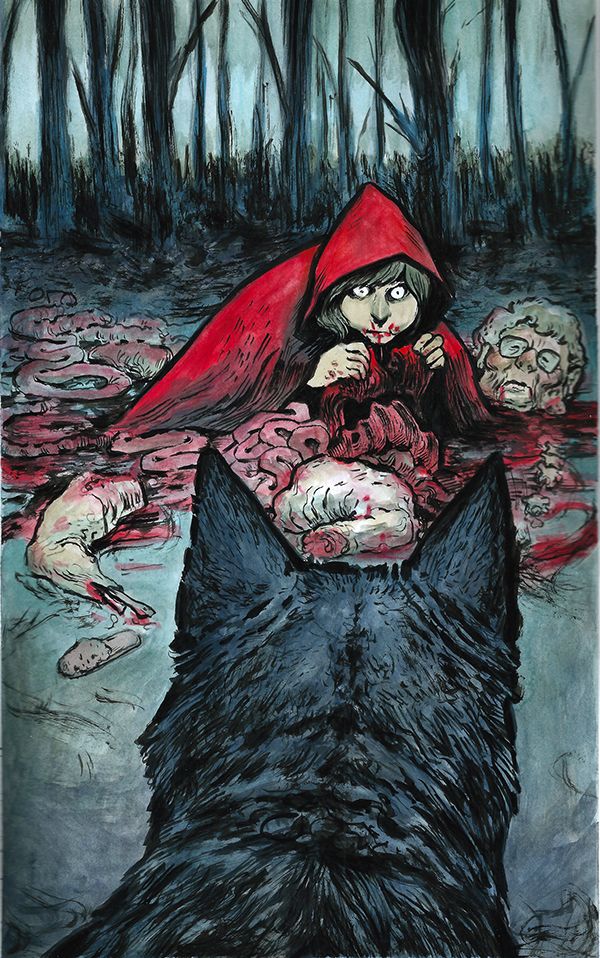
Grandma gave her a little red riding hood for her birthday. Since then, the girl went everywhere in her new, elegant red cap. Neighbors said this about her:
— Here comes Little Red Riding Hood!
Once a mother baked a pie and said to her daughter:
— You, Little Red Riding Hood, go to your grandmother, take this pie and a pot of butter to her and find out if she is healthy.
Little Red Riding Hood got ready and went to her grandmother in another village.
She is walking through the forest, and towards her is a gray wolf.
He really wanted to eat Little Red Riding Hood, but he didn't dare - somewhere nearby, woodcutters were banging with axes.
The Wolf licked his lips and asked the girl:
— Where are you going, Little Red Riding Hood?
Little Red Riding Hood didn't know how dangerous it was to stop in the forest and talk to wolves. She greeted Wolf and said:
- I'm going to my grandmother and bring her this pie and a pot of butter.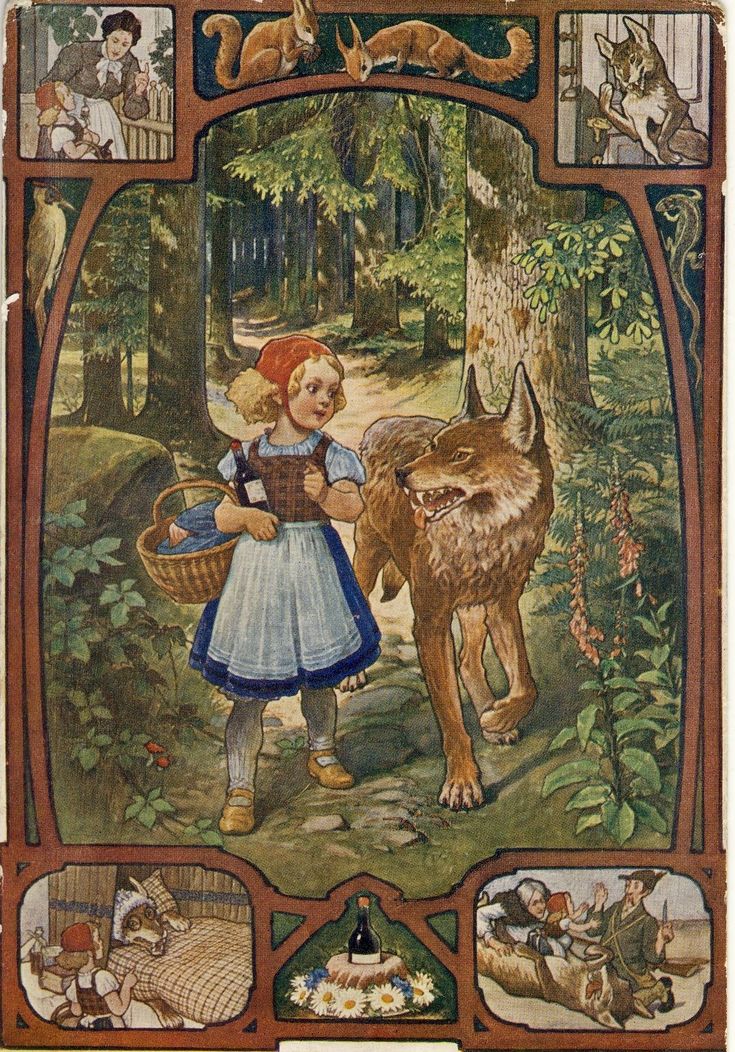
— Does your grandmother live far away? Wolf asks.
"Quite far," says Little Red Riding Hood. - Over there in that village, behind the mill, in the first house on the edge.
— All right, — Wolf says, — I also want to visit your grandmother. I'll go down this road, and you go down that one. Let's see which one of us comes first.
Wolf said this and ran as fast as he could along the shortest path.
And Little Red Riding Hood went along the longest road. She walked slowly, stopping every now and then along the way, picking flowers and collecting them in bouquets.
Before she had even reached the mill, the Wolf had already galloped up to her grandmother's house and was knocking on the door:
— Knock, knock!
Who is there? Grandma asks.
"It's me, your granddaughter, Little Red Riding Hood," answers the Wolf in a thin voice. - I came to visit you, I brought a pie and a pot of butter.
Grandma was sick at the time and was in bed.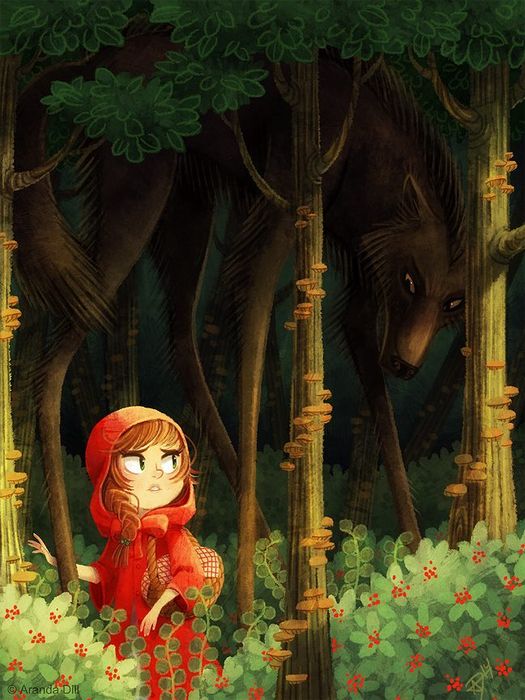 She thought it was really Little Red Riding Hood and called out:
She thought it was really Little Red Riding Hood and called out:
— Pull the string, my child, and the door will open!
The wolf pulled the string and the door opened.
The wolf rushed at the grandmother and swallowed her at once. He was very hungry because he had not eaten anything for three days. Then he closed the door, lay down on his grandmother's bed and began to wait for Little Red Riding Hood. Soon she came and knocked:
- Knock knock! - Who's there? Wolf asks.
And his voice is rough, hoarse.
Little Red Riding Hood was frightened, but then she thought that her grandmother was hoarse from a cold and that's why she had such a voice.
"It's me, your granddaughter," says Little Red Riding Hood. I brought you a pie and a pot of butter.
The wolf cleared his throat and said more subtly:
— Pull the string, my child, the door will open.
Little Red Riding Hood pulled the string - the door opened.
The girl entered the house, and the Wolf hid under the covers and said:
- Granddaughter, put the pie on the table, put the pot on the shelf, and lie down next to me.